When You Write

A Short Story That Teaches A Lesson: The Power Of Morality In Fiction
Do you remember the last time you were so engrossed in a story that you forgot where you were? The power of fiction lies in its ability to transport us to different worlds, where we can experience emotions and lessons that we may not encounter in our daily lives.
And when it comes to lessons, moral storytelling can be particularly impactful. A short story that teaches a lesson can stay with us long after the last page is turned, influencing our thoughts and actions in unexpected ways.
But what makes a moral story effective? Is it the message itself, or the way it is presented?
In this article, we will explore the power of morality in fiction, and how it can be used to create engaging and emotionally resonant stories. Whether you are a reader looking for inspiration, or a writer seeking to improve your craft, we hope this exploration of moral storytelling will leave you with a deeper appreciation for the power of words.
Key Takeaways
- Moral storytelling can have a powerful impact on readers by transporting them and teaching them lessons.
- Effective moral storytelling requires relatable characters and situations, consequences and lessons learned, and emotional impact on readers.
- Fictional stories that deal with moral issues help us to explore our own values and beliefs, and can inspire change and shape beliefs and perspectives.
- The power of moral fiction lies in its ability to shape both individual and societal values, making it a crucial tool for promoting positive change.
The Importance of Moral Lessons in Fiction
You can’t help but feel connected to characters who face moral dilemmas. When we read a story about someone struggling with their conscience, we see a reflection of our own inner conflicts. It’s through their struggles that we learn valuable lessons about our own lives. This is the power of moral storytelling in fiction.
It allows us to explore the complexities of moral dilemmas and find empathy for those who face them. The role of empathy and relatability in moral storytelling cannot be overstated. When we read about characters who face tough ethical decisions, we are forced to put ourselves in their shoes.
We consider what we would do in their place, and we develop a deeper understanding of what it means to be human. Fictional stories that deal with moral issues help us to explore our own values and beliefs, and they challenge us to think about the world in a new way. By engaging with these stories, we become more empathetic, more compassionate, and more aware of the complex nature of morality.
The Elements of Effective Moral Storytelling
When it comes to effective moral storytelling, three key elements come to mind:
- Relatable characters and situations
- Consequences and lessons learned
- Emotional impact on readers
You want your readers to be invested in the characters and their struggles, and to see themselves or people they know in the situations presented in the story.
The consequences of the character’s actions should be clear and meaningful, leading to valuable lessons that can be learned.
And finally, the emotional impact of the story should be powerful, leaving readers with a lasting impression and a desire to share the story with others.
Relatable Characters and Situations
As a reader, it’s easy to become invested in the relatable characters and situations presented in a story, allowing us to connect with the moral lessons on a deeper level. When we see characters facing situations that we ourselves have experienced, it creates a sense of familiarity that draws us in and helps us empathize with them.
This empathy is crucial for effective moral storytelling, as it allows us to see the world through the eyes of others, and ultimately, to learn from their experiences.
To make the characters and situations in a story relatable, authors often incorporate universal themes that resonate with readers across cultures and time periods. These can include themes like love, loss, betrayal, and redemption, which are all experiences that most people can relate to on some level.
By exploring these themes through the lens of relatable characters, authors are able to create stories that are both emotionally impactful and thought-provoking. When we see characters overcome challenges and learn valuable lessons, it inspires us to do the same, making us better people in the process.
Consequences and Lessons Learned
By exploring the consequences of characters’ actions and the lessons they learn, authors can create thought-provoking and emotionally impactful stories.
When characters face the consequences of their actions, whether positive or negative, they have the opportunity for personal growth. This growth can manifest in a multitude of ways, from realizing the error of their ways and seeking forgiveness to standing up for what they believe in and making a positive change in their world.
The lessons learned by characters in fiction can also have real-world application. As readers, we can learn from the mistakes and successes of fictional characters and apply those lessons to our own lives. This is the power of morality in fiction – it allows us to explore the consequences of our actions and the lessons we can learn from them, all within the safe confines of a story.
By incorporating personal growth and real-world application into their stories, authors can create narratives that not only entertain but also inspire change.
Emotional Impact on Readers
Immerse yourself in a well-crafted narrative and you’ll find yourself feeling the emotional impact of the story’s twists and turns. The power of morality in fiction lies in the emotional impact it has on readers.
By exploring the psychology behind emotional impact, writers can create stories that resonate with readers long after they’ve finished the last page.
Analyzing reader responses is key to understanding the emotional impact of a story. When readers become emotionally invested in a character’s journey, they’re more likely to remember the lessons learned.
By creating characters that readers can relate to on a personal level, writers can explore moral themes that are universally relevant. Whether it’s a story about love, loss, or redemption, a well-crafted narrative can leave a lasting impact on readers, shaping their beliefs and perspectives for years to come.
Examples of Short Stories with Powerful Morals
You’re in for a treat! Let’s delve into the world of short stories with powerful morals.
‘The Lottery’ by Shirley Jackson will have you questioning the traditions of your community, while ‘The Tell-Tale Heart’ by Edgar Allan Poe will send shivers down your spine with its haunting depiction of guilt.
And who can forget ‘The Gift of the Magi’ by O. Henry? It’s a heartwarming tale of sacrifice and love during the holiday season.
These stories are sure to leave a lasting impression on you and make you reflect on the power of storytelling.
“The Lottery” by Shirley Jackson
Step into the world of ‘The Lottery’ and witness the shocking consequences of blindly following tradition. Shirley Jackson’s chilling short story explores the dark side of human nature and the dangers of mindlessly adhering to societal norms.
Set in a small, seemingly idyllic village, ‘The Lottery’ centers around an annual ritual where one person is selected to be stoned to death by the other villagers.
Symbolism runs rampant throughout the story, with objects like the black box and the stones taking on deeper meaning as the plot unfolds. The significance of tradition is also a major theme, as the villagers continue to participate in the lottery despite its horrific outcome.
Jackson’s masterful storytelling keeps readers on the edge of their seats, questioning the morality of the characters and the society they live in. ‘The Lottery’ is a haunting reminder of the power of conformity and the importance of questioning the status quo.
“The Tell-Tale Heart” by Edgar Allan Poe
Listen closely, friend, and let me tell you about a heart that beats like a madman’s drum, driving its owner to the brink of insanity in Edgar Allan Poe’s ‘The Tell-Tale Heart’.
The story is a psychological horror that delves into the mind of an unnamed narrator who is obsessed with an old man’s pale blue eye. The narrator’s obsession with the eye leads him to commit a heinous crime that ultimately drives him to madness.
The power of symbolism and foreshadowing in ‘The Tell-Tale Heart’ can’t be ignored. From the first line of the story, the reader is given a glimpse of what is to come. The narrator tells us that he’s not mad, yet it’s clear that he is.
The sound of the heart beating under the floorboards is a symbol of the narrator’s guilt, and it foreshadows his eventual downfall. The heart’s beating grows louder and more frantic as the story progresses, mirroring the narrator’s own descent into madness.
‘The Tell-Tale Heart’ is a chilling reminder that our actions have consequences, and that guilt can drive us to the brink of insanity.
“The Gift of the Magi” by O. Henry
Take a moment to imagine yourself in the shoes of Jim or Della, the loving couple in O. Henry’s ‘The Gift of the Magi’, who make a selfless sacrifice to show their love for one another.
The irony of sacrifice is a powerful theme that resonates throughout the story, leaving a lasting impact on the reader’s mind.
O. Henry’s writing style is both engaging and emotionally impactful, drawing the reader into the plot and keeping them invested until the very end.
The story follows the couple, who are struggling financially, as they try to find the perfect Christmas gift for one another.
Della sells her beautiful long hair to a wig-maker to buy a chain for Jim’s beloved pocket watch, while Jim sells his watch to buy combs for Della’s hair.
When they exchange gifts, they realize the irony of their sacrifice and the depth of their love for one another.
This heartwarming tale teaches us that true love is about selflessness and sacrifice, rather than material possessions.
O. Henry’s writing style, with its clever use of irony and powerful emotional impact, makes ‘The Gift of the Magi’ a timeless classic that continues to inspire readers today.
Incorporating Morality into Your Own Writing
Incorporating morality into your writing can deepen the emotional impact of your story. J.K. Rowling’s Harry Potter series is a great example of this, where the characters’ choices and actions are guided by their moral compasses. By exploring themes of love, friendship, sacrifice, and redemption, Rowling created a world where the characters face moral dilemmas and make difficult choices that ultimately shape their fate.
By developing characters with strong moral values, readers become invested in their journey and feel a sense of satisfaction when they make morally correct decisions. Crafting a plot and conveying a message through morality can also add depth to your story. By creating a conflict that challenges the characters’ moral beliefs, you can create a sense of tension and suspense that keeps the reader engaged.
As the characters navigate through the moral gray area, readers are forced to confront their own beliefs and values. This emotional connection to the characters and their struggles can create a lasting impact on the reader, leaving them with a message that resonates long after they’ve finished reading.
So, when writing your own stories, don’t be afraid to explore the complex themes of morality and use it as a tool to create a more impactful and memorable story.
The Lasting Impact of Moral Fiction
Experiencing a tale that challenges your beliefs and values can leave a profound and long-lasting impression on your psyche. This is the power of moral fiction.
Stories that explore complex themes and challenge societal norms have real-world applications. They encourage readers to critically examine their own moral compass and consider the impact of their actions on others.
The lasting impact of moral fiction can also be seen in its cultural significance. Stories that explore themes of love, forgiveness, and compassion have the power to shape our collective understanding of these concepts.
By presenting a nuanced portrayal of morality, authors can contribute to broader cultural conversations and inspire readers to become more empathetic and compassionate individuals. The power of moral fiction lies in its ability to shape both individual and societal values, making it a crucial tool for promoting positive change.
You leave the world of fiction, but the power of its morals lingers on.
These stories, with their timeless lessons and relatable characters, have the ability to touch your heart and change your perspective. They’re more than just entertainment, they’re tools for personal growth and societal change.
As you reflect on the short stories that have impacted you, remember that you too have the power to incorporate morality into your own writing.
For as long as people crave stories, there will always be a need for tales that teach us the value of kindness, empathy, and compassion. So use your words to inspire, challenge, and uplift your readers.
Recommended Reading...
Why short stories are important for readers and writers alike, why do authors use short stories the advantages of this genre, why are short stories so hard to write understanding the challenges, what is a novelette exploring the short story genre.
Keep in mind that we may receive commissions when you click our links and make purchases. However, this does not impact our reviews and comparisons. We try our best to keep things fair and balanced, in order to help you make the best choice for you.
As an Amazon Associate, I earn from qualifying purchases.
© 2024 When You Write

8 Standout Short Stories With Moral Lessons
Nov 22, 2023
Sometimes, I want a short story to simply be a moment of escape. I don’t want to experience an important life lesson; I just want to be entertained like in Shirley Jackson’s “The Lottery” or Edgar Allan Poe’s “The Tell-Tale Heart.” Other times, however, I want to soak in short stories with moral ideals!
A moral, or theme, teaches us something about ourselves and others. We get to learn and grow in some tangible way, and stories that provide this offering are necessary in the literary canon.
Keep reading below for 8 Standout Short Stories With Moral Lessons that you can use in ANY secondary classroom!
Need help with Reading Test Prep? Check out this FREE Pack of 3 Test Prep Activities to help students achieve success on standardized tests!

Table of Contents
A moral, for all intended purposes, is another word for THEME. A theme is the message of a text. Because it is a message, it MUST be written in a complete sentence and contain a connection to a topic or idea from the text. A simple phrase is not quite enough for a thematic statement .
Developing themes for short stories with moral lessons would be a fantastic focus while reading any of the texts below!
1. “To Build a Fire” by Jack London
I love “To Build a Fire” so much! It mirrors my own life in so many ways, which is why it is one of my favorite short stories with moral lessons!
The protagonist, a man with an overabundance of pride and confidence, ultimately fails in an extreme fight for survival. Like me, he believes he can defy the odds and escape an impossible situation.
Teaching this story with passages from The Call of the Wild or White Fang might help in rounding out similar ideas regarding the conflict of Man vs. Nature !
Click below for easy-to-teach activities for To Build a Fire by Jack London!

2. “The Cactus” by O. Henry
One of my favorite things about this short story by O. Henry is its clever twist ending! Many short stories with moral lessons have similar twist endings, which could be why they make such great additions to thematic units !
O. Henry’s “The Cactus” tells the story of a budding romance. A young man tries to charm a young woman, but his boastful nature leads to an unfortunate misunderstanding.
Personally, I think we have all been there, at least when it comes to boastfulness. We all have something we get a little prideful about, to our own detriment most of the time.
You could teach a simple plot activity or examine how the characters change and/or develop over the course of the story!
Click to get teaching ideas here>>> The Cactus Lesson BUNDLE

3. “After Twenty Years” by O. Henry
Loyalty is a concept students are extremely focused on in middle and high school, so including short stories with moral ideas connected to loyalty is a great way to encourage students to engage with certain texts! How can a student even navigate the school hallways without friends to help along the way? Loyalty is vital!
But all friendships change over time as any adult knows. The main characters, an officer and a criminal, experience this situation in the story “After Twenty Years” by O. Henry !
Breaking down this easy-to-read plot through a focus on comparing and contrasting the two main characters will help your students get to the moral (theme) of the story quite easily, as you really feel for both characters (even the criminal one).
Click to buy this BUNDLE to make teaching this short story SIMPLE & EASY!
4. “The Pedestrian” by Ray Bradbury
The story “The Pedestrian,” like its title, is incredibly unassuming. A man in a not-far-off future walks his neighborhood alone. Unlike others who sit in front of screens day and night, the protagonist chooses to go for a stroll, a seemingly innocuous activity.
While on his walk, he encounters an unmanned, robotic police vehicle. Because of its programming, it cannot understand Leonard’s (protagonist’s) intentions and labels him mentally incapable, carting him off to an asylum.
This dark tale teaches about the dangers of reliance on and addiction to technology, a moral we can all learn from! If you need help teaching characterization and theme for “The Pedestrian,” go here !
Need some ideas for teaching scary short stories? Click below!

5. “The Gift of the Magi” by O. Henry
If you are anywhere near the holiday season, “The Gift of the Magi” by O. Henry is one of the best short stories with moral attributes woven throughout!
This short story depicts a couple lamenting their slightly impoverished state. They want to give each other gifts to celebrate the Christmas season; however, they have limited means, like most people in the world today.
Instead of sitting around moping, they both choose to sacrifice the little they have in an interesting way in order to surprise the other for Christmas. The moral, or theme, involving sacrifice will encourage anyone who reads this short story to think beyond oneself during the holiday season.
Want an easy way to teach characterization, reading comprehension, and visualization for The Gift of the Magi ? Click the image below!

6. “The Scarlet Ibis” by James Hurst
I don’t know about you, but if you have read “The Scarlet Ibis” by James Hurst , I know you MUST have shed a tear or two. Good short stories with moral elements tend to do so unexpectedly.
Two brothers, one of whom experiences a disability, interact with each other as many siblings do. There is a constant tug of war between brotherly love and annoyance that most people with brothers or sisters can readily understand.
By the end of the story, we cry with the protagonist as he weeps for his brother who dies a tragic death. This story may be difficult to read for some, but it is completely worth it.
We need to be reminded once in a while that life is not just about us and what makes us happy. It also involves investing in the lives of others, especially in the lives of those less fortunate than we are. Ultimately, patience regarding family must take center place in our lives, which the protagonist learns too late. If you need step-by-step activities to teach this classic story, see this link !
7. “The Necklace” by Guy de Maupassant
I have yet to teach a student who did not like “The Necklace” by Guy de Maupassant . And engagement is super important when choosing short stories with moral concepts!
Unlike the female protagonist in “The Gift of the Magi,” Mathilde Loisel in the story “The Necklace” is self-focused. She cannot see the beauty of the comfort and security of her middle-class life.
Instead, she always thinks about the finer things in life she cannot attain. I think we have all been there a time or two. We may not envision the same “finer” things, but we all pretty much want more than we currently have.
When Mathilde Loisel is invited to a party, she borrows her friend’s necklace, a symbol to her of wealth. At some point, she loses the “expensive” diamond necklace and replaces it without telling her friend about its loss. Now, deep in debt, she and her husband become embittered and worn down through extremely difficult physical work. The resolution of the story involves the revelation that the necklace was, in fact, a cheap fake.
Can you imagine the impact of this knowledge on your psyche? Sometimes, it is simply better to tell the truth, even if it hurts your pride to do so. Clearly, this story shines as a prime example of classic short stories with moral concepts everyone should read!
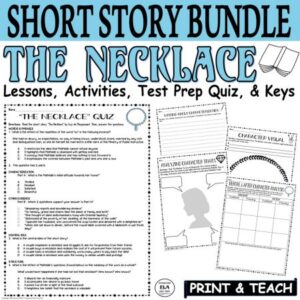
8. “Thank You, Ma’am” (also known as “Thank You, M’am”) by Langston Hughes
During or around the week of Thanksgiving, “Thank You, Ma’am” (also known as “Thank You, M’am”) by Langston Hughes is one of THE BEST short stories with moral lessons to teach!
Let me give you a quick recap: A young boy attempts to steal a person from an older woman. Interestingly, she does not call the police and demand immediate punishment but invites the young man into her home, feeds him, and demonstrates love and care towards him.
Everyone could learn a thing or two from the older woman, Mrs. Jones.
Here are some thematic statements/morals one could learn from this story:
- Sometimes it is difficult to fathom someone’s kindness.
- Certain moments in life can change how you see someone.

Why teach short stories with moral lessons?
So often, our English curricula are rife with death, destruction, and despair. Think Romeo and Juliet, “The Raven,” or “An Occurrence at Owl Creek Bridge.” Don’t get me wrong; I love a good scare or death scene.
Sometimes, however, I want to feel hope in the human experience. We need to read about life, love, freedom, and other ideals that are important to us. Foremost, we must offer more short stories with moral lessons to our students, so they too can experience what can be!
If you want to make teaching short stories with moral lessons or other entertaining tales an EASY feat, get the BUNDLE below!

Need more help with teaching short stories with moral lessons? Check out my store Kristin Menke-Integrated ELA Test Prep !

Hi, I’m KRISTIN!
I primarily focus on integrating multiple disciplines and subjects. The goal is to make teaching simplified and effective!
Let's Connect
- Follow Follow
Click below to download “13 Simple Strategies to make test prep a breeze!”

How to Write a Morality or Redemption Story
What is a morality story, why write a morality story, how do i write a morality story, what’s the controlling idea of a morality story, the morality genre elicits core emotions..

Genres have Obligatory Scenes.
What are the obligatory scenes, of the morality genre.
- A shock (negative or positive) upsets the hibernating authentic self of the protagonist. Every story has an inciting incident that disrupts the protagonist’s ordinary life. What that incident disrupts depends on the genre. The inciting incident of a Morality story is a challenge to the morals of the protagonist. It must put them under pressure.
- In overtly refusing the Hero’s Journey call to change, the protagonist expresses an inner darkness.
- The protagonist’s refusal of the call complicates the story and the call comes a second time but in a different form.
- The protagonist faces an All Is Lost Moment and either discovers their inner moral code or chooses the immoral path. Whether or not the protagonist ultimately accepts the call depends upon the subgenre, the kind of story you want to tell.
- The big event (climax) of the story is when the protagonist actively sacrifices self in service of an individual, a group, or humanity (positive) or consciously chooses to remain selfish (negative). This Core Event is your main determinant of subgenre.
- The protagonist faces literal or metaphorical death and either loses the battle but gains self-respect, meaning, and peace; or wins the battle but loses those things at great sacrifice. In all internal genres, there is a paradoxical ending.
Genres have Conventions.
What are the conventions of the morality genre.
- The protagonist has a spiritual mentor or sidekick, for better or worse. This character may lead the protagonist astray or encourage moral behavior.
- There is a seemingly impossible external conflict. A strong Morality story can generate an external secondary genre naturally by simply meeting this convention.
- The protagonist is tormented by ghosts/memories/events of their past. Whether they are able to overcome these and make the right choices in the end depends upon your subgenre.
- There is a foil for your protagonist. This is the character who embodies the ideals and attributes opposite of your character. This character exists to show the reader the other path your protagonist could have taken.
- The protagonist receives assistance from unexpected sources. Some examples are the characters who tell the protagonist “the truth” such as the ghosts in A Christmas Carol and Hamlet , Eldridge calling out James in The Hurt Locker . They can also be the characters who enable the protagonist, like Harling (the protagonist’s drug dealer) in Flight . Note: If you are having trouble writing this one, again look to your secondary external genre and see if you can meet this one through needs of that story and integrate. It’s always a good idea when you can overlap your Obligatory Scenes and Conventions from your primary with your secondary.
What are the Subgenres of the Morality Genre?
Testing/triumph, what are some companion genres for the morality genre, putting it all together:, about the author.

2 thoughts on “ How to Write a Morality or Redemption Story ”
I’m trying to get a good internal sense of the morality story, and am trying to understand “impossible external conflict”. I suspect Sophie’s Choice is a good example, but there must be others that I know and I just can’t see. Any suggestions?
Great question. An external choice in a Morality story is what the protagonist must choose between in their physical environment. It’s the crisis choice pressing the protagonist to act and demonstrate their emotional/intellectual growth or lack thereof. In Charles Dickens’s 1843 novella, A Christmas Carol, Scrooge must choose between selfishness and altruism (Morality, internal question) and that is externally demonstrated by his need to choose between hoarding money (personal financial wealth) and a more equitable distribution of wealth (sharing money with the poor). This decision has life and death stakes for Tiny Tim (Action) and the threat of eternal damnation (Horror) for Scrooge. Scrooge make the right choice, before it’s too late so Tiny Tim lives and Scrooge is rewarded with personal connection to others, a new and more positive attitude, and an implied less lonely life. So what is it that your protagonist must choose between in their external world and act upon? What is the big action/choice that proves the character deserves or fails to deserve redemption?
Leave a Reply Cancel reply
Your email address will not be published. Required fields are marked *
Currently you have JavaScript disabled. In order to post comments, please make sure JavaScript and Cookies are enabled, and reload the page. Click here for instructions on how to enable JavaScript in your browser.
Looking to publish? Meet your dream editor, designer and marketer on Reedsy.
Find the perfect editor for your next book
1 million authors trust the professionals on Reedsy. Come meet them.
Last updated on Oct 29, 2023
How to Write a Short Story in 9 Simple Steps
This post is written by UK writer Robert Grossmith. His short stories have been widely anthologized, including in The Time Out Book of London Short Stories , The Best of Best Short Stories , and The Penguin Book of First World War Stories . You can collaborate with him on your own short stories here on Reedsy .
The joy of writing short stories is, in many ways, tied to its limitations. Developing characters, conflict, and a premise within a few pages is a thrilling challenge that many writers relish — even after they've "graduated" to long-form fiction.
In this article, I’ll take you through the process of writing a short story, from idea conception to the final draft.
How to write a short story:
1. Know what a short story is versus a novel
2. pick a simple, central premise, 3. build a small but distinct cast of characters, 4. begin writing close to the end, 5. shut out your internal editor, 6. finish the first draft, 7. edit the short story, 8. share the story with beta readers, 9. submit the short story to publications.
But first, let’s talk about what makes a short story different from a novel.
The simple answer to this question, of course, is that the short story is shorter than the novel, usually coming in at between, say, 1,000-15,000 words. Any shorter and you’re into flash fiction territory. Any longer and you’re approaching novella length .
As far as other features are concerned, it’s easier to define the short story by what it lacks compared to the novel . For example, the short story usually has:
- fewer characters than a novel
- a single point of view, either first person or third person
- a single storyline without subplots
- less in the way of back story or exposition than a novel
If backstory is needed at all, it should come late in the story and be kept to a minimum.
It’s worth remembering too that some of the best short stories consist of a single dramatic episode in the form of a vignette or epiphany.

GET ACCOUNTABILITY
Meet writing coaches on Reedsy
Industry insiders can help you hone your craft, finish your draft, and get published.
A short story can begin life in all sorts of ways.
It may be suggested by a simple but powerful image that imprints itself on the mind. It may derive from the contemplation of a particular character type — someone you know perhaps — that you’re keen to understand and explore. It may arise out of a memorable incident in your own life.

For example:
- Kafka began “The Metamorphosis” with the intuition that a premise in which the protagonist wakes one morning to find he’s been transformed into a giant insect would allow him to explore questions about human relationships and the human condition.
- Herman Melville’s “Bartleby the Scrivener” takes the basic idea of a lowly clerk who decides he will no longer do anything he doesn’t personally wish to do, and turns it into a multi-layered tale capable of a variety of interpretations.
When I look back on some of my own short stories, I find a similar dynamic at work: a simple originating idea slowly expands to become something more nuanced and less formulaic.
So how do you find this “first heartbeat” of your own short story? Here are several ways to do so.
Experiment with writing prompts
Eagle-eyed readers will notice that the story premises mentioned above actually have a great deal in common with writing prompts like the ones put forward each week in Reedsy’s short story competition . Try it out! These prompts are often themed in a way that’s designed to narrow the focus for the writer so that one isn’t confronted with a completely blank canvas.

Turn to the originals
Take a story or novel you admire and think about how you might rework it, changing a key element. (“Pride and Prejudice and Vampires” is perhaps an extreme product of this exercise.) It doesn’t matter that your proposed reworking will probably never amount to more than a skimpy mental reimagining — it may well throw up collateral narrative possibilities along the way.
Keep a notebook
Finally, keep a notebook in which to jot down stray observations and story ideas whenever they occur to you. Again, most of what you write will be stuff you never return to, and it may even fail to make sense when you reread it. But lurking among the dross may be that one rough diamond that makes all the rest worthwhile.
Like I mentioned earlier, short stories usually contain far fewer characters than novels. Readers also need to know far less about the characters in a short story than we do in a novel (sometimes it’s the lack of information about a particular character in a story that adds to the mystery surrounding them, making them more compelling).

Yet it remains the case that creating memorable characters should be one of your principal goals. Think of your own family, friends and colleagues. Do you ever get them confused with one another? Probably not.
Your dramatis personae should be just as easily distinguishable from one another, either through their appearance, behavior, speech patterns, or some other unique trait. If you find yourself struggling, a character profile template like the one you can download for free below is particularly helpful in this stage of writing.
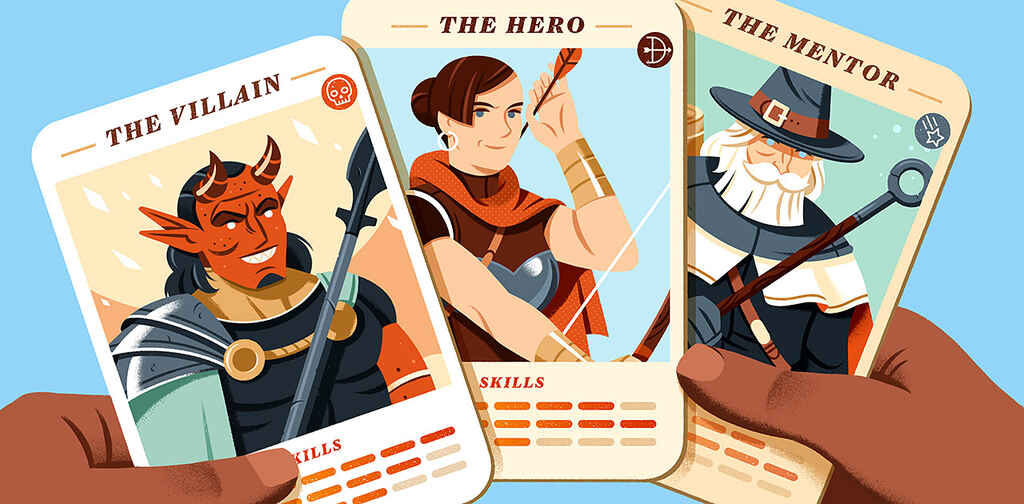
FREE RESOURCE
Reedsy’s Character Profile Template
A story is only as strong as its characters. Fill this out to develop yours.
- “The Yellow Wallpaper” by Charlotte Perkins Gilman features a cast of two: the narrator and her husband. How does Gilman give her narrator uniquely identifying features?
- “The Tell-Tale Heart” by Edgar Allan Poe features a cast of three: the narrator, the old man, and the police. How does Poe use speech patterns in dialogue and within the text itself to convey important information about the narrator?
- “A Good Man Is Hard to Find” by Flannery O’Connor is perhaps an exception: its cast of characters amounts to a whopping (for a short story) nine. How does she introduce each character? In what way does she make each character, in particular The Misfit, distinct?

He’s right: avoid the preliminary exposition or extended scene-setting. Begin your story by plunging straight into the heart of the action. What most readers want from a story is drama and conflict, and this is often best achieved by beginning in media res . You have no time to waste in a short story. The first sentence of your story is crucial, and needs to grab the reader’s attention to make them want to read on.
One way to do this is to write an opening sentence that makes the reader ask questions. For example, Kingsley Amis once said, tongue-in-cheek, that in the future he would only read novels that began with the words: “A shot rang out.”
This simple sentence is actually quite telling. It introduces the stakes: there’s an immediate element of physical danger, and therefore jeopardy for someone. But it also raises questions that the reader will want answered. Who fired the shot? Who or what were they aiming at, and why? Where is this happening?
We read fiction for the most part to get answers to questions. For example, if you begin your story with a character who behaves in an unexpected way, the reader will want to know why he or she is behaving like this. What motivates their unusual behavior? Do they know that what they’re doing or saying is odd? Do they perhaps have something to hide? Can we trust this character?
As the author, you can answer these questions later (that is, answer them dramatically rather than through exposition). But since we’re speaking of the beginning of a story, at the moment it’s enough simply to deliver an opening sentence that piques the reader’s curiosity, raises questions, and keeps them reading.
“Anything goes” should be your maxim when embarking on your first draft.

FREE COURSE
How to Craft a Killer Short Story
From pacing to character development, master the elements of short fiction.
By that, I mean: kill the editor in your head and give your imagination free rein. Remember, you’re beginning with a blank page. Anything you put down will be an improvement on what’s currently there, which is nothing. And there’s a prescription for any obstacle you might encounter at this stage of writing.
- Worried that you’re overwriting? Don’t worry. It’s easier to cut material in later drafts once you’ve sketched out the whole story.
- Got stuck, but know what happens later? Leave a gap. There’s no necessity to write the story sequentially. You can always come back and fill in the gap once the rest of the story is complete.
- Have a half-developed scene that’s hard for you to get onto the page? Write it in note form for the time being. You might find that it relieves the pressure of having to write in complete sentences from the get-go.
Most of my stories were begun with no idea of their eventual destination, but merely an approximate direction of travel. To put it another way, I’m a ‘pantser’ (flying by the seat of my pants, making it up as I go along) rather than a planner. There is, of course, no right way to write your first draft. What matters is that you have a first draft on your hands at the end of the day.
It’s hard to overstate the importance of the ending of a short story : it can rescue an inferior story or ruin an otherwise superior one.
If you’re a planner, you will already know the broad outlines of the ending. If you’re a pantser like me, you won’t — though you’ll hope that a number of possible endings will have occurred to you in the course of writing and rewriting the story!
In both cases, keep in mind that what you’re after is an ending that’s true to the internal logic of the story without being obvious or predictable. What you want to avoid is an ending that evokes one of two reactions:
- “Is that it?” aka “The author has failed to resolve the questions raised by the story.”
- “WTF!” aka “This ending is simply confusing.”
Like Truman Capote said, “Good writing is rewriting.”
Once you have a first draft, the real work begins. This is when you move things around, tightening the nuts and bolts of the piece to make sure it holds together and resembles the shape it took in your mind when you first conceived it.
In most cases, this means reading through your first draft again (and again). In this stage of editing , think to yourself:
- Which narrative threads are already in place?
- Which may need to be added or developed further?
- Which need to perhaps be eliminated altogether?

All that’s left afterward is the final polish . Here’s where you interrogate every word, every sentence, to make sure it’s earned its place in the story:
- Is that really what I mean?
- Could I have said that better?
- Have I used that word correctly?
- Is that sentence too long?
- Have I removed any clichés?
Trust me: this can be the most satisfying part of the writing process. The heavy lifting is done, the walls have been painted, the furniture is in place. All you have to do now is hang a few pictures, plump the cushions and put some flowers in a vase.
Eventually, you may reach a point where you’ve reread and rewritten your story so many times that you simply can’t bear to look at it again. If this happens, put the story aside and try to forget about it.
When you do finally return to it, weeks or even months later, you’ll probably be surprised at how the intervening period has allowed you to see the story with a fresh pair of eyes. And whereas it might have felt like removing one of your own internal organs to cut such a sentence or paragraph before, now it feels like a liberation.
The story, you can see, is better as a result. It was only your bloated appendix you removed, not a vital organ.
It’s at this point that you should call on the services of beta readers if you have them. This can be a daunting prospect: what if the response is less enthusiastic than you’re hoping for? But think about it this way: if you’re expecting complete strangers to read and enjoy your story, then you shouldn’t be afraid of trying it out first on a more sympathetic audience.
This is also why I’d suggest delaying this stage of the writing process until you feel sure your story is complete. It’s one thing to ask a friend to read and comment on your new story. It’s quite another thing to return to them sometime later with, “I’ve made some changes to the story — would you mind reading it again?”

So how do you know your story’s really finished? This is a question that people have put to me. My reply tends to be: I know the story’s finished when I can’t see how to make it any better.
This is when you can finally put down your pencil (or keyboard), rest content with your work for a few days, then submit it so that people can read your work. And you can start with this directory of literary magazines once you're at this step.
The truth is, in my experience, there’s actually no such thing as a final draft. Even after you’ve submitted your story somewhere — and even if you’re lucky enough to have it accepted — there will probably be the odd word here or there that you’d like to change.
Don’t worry about this. Large-scale changes are probably out of the question at this stage, but a sympathetic editor should be willing to implement any small changes right up to the time of publication.
Join a community of over 1 million authors
Reedsy is more than just a blog. Become a member today to discover how we can help you publish a beautiful book.
Bring your short stories to life
Fuse character, story, and conflict with tools in the Reedsy Book Editor. 100% free.

1 million authors trust the professionals on Reedsy. Come meet them.
Enter your email or get started with a social account:

A short guide to writing stories where the inner conflict is morality

Writing software you'll actually love
Outlining tools
Advanced goal setting
Project templates
Collaboration
Compare plans

Stories that explore moral dilemmas and inner conflicts of morality can be some of the most compelling and thought-provoking works of fiction. In this article, we will discuss the key aspects of the internal content genre of morality-driven stories, including what makes this genre unique, how to choose it for your story, the conventions of morality-driven stories, and the obligatory scenes that must be present.
What is the morality genre?
A morality-driven story follows the protagonist as they navigate ethical dilemmas and make morally significant decisions, resulting in personal growth or a change in values. The exploration of ethical dilemmas and the gray areas between right and wrong is a key element of the morality genre.
Morality is an internal content genre . Internal content genres explore themes of personal growth, self-discovery, and transformation. By highlighting the protagonist's emotional development, internal content genres create a more in-depth and layered narrative.
When to choose morality as an internal content genre
Choose morality as your internal content genre if you want to create a story that delves into the complexities of ethical decision-making, highlights the nuances of human behaviour, and emphasizes character development over plot-driven action. This genre is an excellent choice for writers interested in exploring philosophical questions and examining the grey areas between right and wrong.
Conventions of morality-driven stories
The morality genre is characterized by several key conventions:
- Ethical dilemmas: The protagonist must face difficult moral choices that test their values and beliefs.
- Consequences: The story should show the consequences of the protagonist's decisions, both positive and negative.
- Character development: The protagonist undergoes a significant change in values or beliefs, either for better or worse.
- Ambiguity: Morality-driven stories often thrive on the ambiguity of ethical situations, leaving readers to ponder the nuances of the protagonist's decisions.
- Reflection: The protagonist should spend time reflecting on their actions and the consequences of their choices.
Obligatory scenes in morality-driven stories
There are certain scenes that readers expect to encounter in a morality-driven novel:
- The Inciting Incident: The protagonist is presented with a moral dilemma or conflict that challenges their existing beliefs and values.
- The Turning Point: The protagonist makes a morally significant decision that sets the course for the rest of the story.
- The Dark Night of the Soul: The protagonist faces the most significant ethical challenge of the story, forcing them to confront their deepest fears and insecurities.
- The Climax: The protagonist makes a final, irrevocable decision that resolves the central moral conflict.
- The Resolution: The consequences of the protagonist's decisions are revealed, and the story concludes with a clear sense of how the protagonist has grown or changed as a result of their moral journey.
Tips for writing a compelling story where the inner conflict is morality
To create a captivating story centred around morality, consider the following tips:
- Conduct research on the social, cultural, and historical context of the era or setting to ensure your story is authentic and accurate, taking into account the diversity of moral values within that context.
- Develop engaging characters with distinct personalities, motivations, and backstories that reflect their moral beliefs, dilemmas, and struggles, allowing readers to connect with their journeys.
- Create a vivid and immersive setting that captures the nuances of the society and its moral landscape, using rich descriptions and sensory details to bring the ethical environment to life.
- Craft an engaging plot that explores the dynamics, conflicts, and relationships arising from moral dilemmas and choices, maintaining reader interest and building tension throughout the story.
- Use authentic language and dialogue that reflects the diverse moral beliefs, values, and customs of the society, while remaining accessible to modern readers.
- Incorporate themes and issues relevant to morality, such as personal responsibility, integrity, sacrifice, and ethical dilemmas, to add depth and complexity to the story.
- Balance character-driven and plot-driven elements, ensuring that both the individual journeys of the characters and the overarching moral challenges are integral to the narrative.
- Employ a variety of narrative techniques, such as multiple perspectives or an omniscient narrator, to provide a comprehensive and nuanced portrayal of the characters' struggles and triumphs related to morality.
Writing a morality-based story can be a challenging yet rewarding experience for both the writer and the reader. By focusing on the inner struggle of morality, you can create a compelling story that delves into the depths of the human experience. This can inspire readers to reflect on their own values and the complexities of ethical decision-making.
- Coyne, Shawn. 2015. The Story Grid. New York, NY: Black Irish Entertainment.
Related posts
You should be writing, but since you're here why not read more articles on this topic?

3 questions to help you figure out your theme

How theme and mood work together

Symbols & motifs in story

Understanding the controlling idea/theme of your story
A Guide to Story Writing in English with Moral | Examples | Prompts | Crafting Ethical Insights

Stories have the profound ability to touch hearts, stir emotions, and sow seeds of wisdom, especially when they come enriched with morals. Engaging in story writing in English with moral allows writers to go mere storytelling.
Crafting narratives that leave behind not just impressions, but also valuable lessons is a great art.
Stories with morals navigate through the intricate tapestry of human experiences, ethics, and emotions. Join us as we delve into the enchanting world of moral story writing, exploring topics, hints, and techniques to craft tales that enthrall and enlighten.”
Table of Contents
Unveiling the art of story writing in english with moral.
Stories are magical, aren’t they? When we dive into story writing in English with moral, we weave not just a tale, but also embed a valuable lesson within it, making the narrative not only enchanting but also enlightening .
Stories are magical, aren’t they? When we dive into story writing in English with moral, we weave not just a tale, but also embed a valuable lesson within it, making the narrative not only enchanting but also enlightening.
The Essence of Incorporating Morals in English Story Writing
Imagine a story where a little bird learns the value of sharing, or a tale where a humble mouse helps a mighty lion.
These stories do more than just entertain; they teach, they guide, and they linger in our minds long after we’ve read them.
Writing a story with a moral isn’t just about the plot; it’s about embedding a valuable lesson seamlessly into a narrative, making the takeaway as delightful as the tale itself.
It’s about crafting stories where the moral isn’t preached, but gently laid out through the adventures, misadventures, choices, and consequences experienced by the characters.
Crafting Engaging Narratives: Examples of Moral Stories
Let’s stroll through an example. Picture a story where a little girl finds a lost puppy. She could keep it, she loves it, after all. But she remembers a poster about a missing puppy and decides to return it to its anxious owners.
Here, the narrative is simple, yet it subtly imparts a moral about honesty and empathy.
Another tale could be about a boy who learns the importance of patience through a tiny seed that slowly, over days and nights, rain and shine, grows into a blooming plant.
The stories are endless, and each one carries a moral, a lesson, wrapped in adventures, smiles, tears, and growth.
Navigating Through English Story Writing Topics
Embarking on the journey of story writing is a thrilling adventure, especially when you dive into the vast ocean of English story writing topics. From adventures in distant lands to heartfelt stories of everyday heroes, the topics you can explore are boundless and filled with potential.
Exploring Diverse Themes and Genres in English Story Writing
Let’s dive into some themes that you might consider weaving your tales around. Here is a perfect answer to the question that what are some of great themes for great Moral Stories-
1. Friendship and Loyalty:
Narratives that explore the depths, challenges, and beauty of true friendship.
2. Courage Amidst Fear:
Stories that spotlight characters who find bravery in times of peril and uncertainty.
3 . The Triumph of Good Over Evil:
Classic tales where protagonists overcome malevolence through virtue and integrity.
4. Love and Sacrifice:
Exploring the myriad facets of love , and the lengths to which individuals go to preserve it.
5. Adventure and Discovery:
Tales that take readers on thrilling journeys, uncovering mysteries and new worlds.
6. Hope in Despair:
Crafting narratives that find light, optimism, and resolution amidst times of sorrow and hopelessness.
7. The Journey of Growth:
Stories that chronicle a character’s evolution, learning, and self-discovery through various experiences.
8. Conflict and Resolution:
Exploring dilemmas, internal or external conflicts, and the paths that lead to resolution or transformation.
9. Justice and Retribution:
Narratives that delve into the concepts of justice, fairness, and the eventual reckoning.
10. Family and Relationships:
Stories that explore the dynamics, bonds, and trials within familial and relational ties.
11. Survival and Resilience:
Tales that showcase the indomitable spirit of characters in the face of adversity and challenges.
12. Fantasy and Magic:
Weaving tales in enchanting worlds, where the ordinary meets the extraordinary through magical elements.
Engaging Readers with Thought-Provoking Topics
Here are some great and thought provoking topics for Story writing in English with moral. These are some in which everyone would be easily interested specially the following writing prompts are designed to craft moral stories:
1. The Selfish Squirrel:
A squirrel who never shares learns the importance of generosity when no one helps him in his time of need.
2. The Lying Parrot:
A parrot who often lies finds himself in trouble when no one believes him during a real crisis.
3. The Envious Butterfly:
A butterfly, envious of another’s colorful wings, learns a valuable lesson about contentment and self-acceptance.
4. The Brave Little Mouse:
A tiny mouse teaches the animal kingdom that courage isn’t about size but about standing up for what is right.
5. The Greedy Monkey:
A monkey, known for his greed, learns the hard way that greed can lead to loss and trouble.
6. The Wise Old Turtle:
A wise old turtle prevents a war between two animal tribes by teaching them the value of dialogue and understanding.
7. The Lazy Rabbit:
A rabbit, known for his laziness, learns the importance of hard work and diligence through a series of events.
8. The Proud Peacock:
A peacock, proud of his beauty, learns that vanity can lead to loneliness and true beauty lies in humility and kindness.
9. The Owl and The Nightingale:
An owl and a nightingale teach each other about the importance of accepting differences and finding common ground.
10. The Selfless Sparrow:
A little sparrow puts herself in danger to save another bird and teaches the forest about bravery and selflessness.
11. The Elephant and The Ant:
An elephant learns the importance of respecting others regardless of their size, when a tiny ant comes to his rescue.
12. The Cat’s True Friend:
A cat learns the value of true friendship when a mouse helps her in a difficult situation, despite her previous unkindness.
13. The Generous Tree :
A tree gives everything to a little boy and teaches him the importance of giving and gratitude.
14. The Fox and The Stork:
A fox and a stork learn that treating others as you wish to be treated is the foundation of fairness and friendship.
15. The Lion’s Weakness:
A mighty lion learns that every creature has its own weaknesses and strengths, and the importance of not underestimating others.
Each of these prompts can be developed into stories that not only entertain but also impart valuable moral lessons to the readers.
Mastering the Skill of Story Writing Using Hints
Let’s explore a few practical examples where we’ll use specific hints to craft short moral stories.
Hints – A Greedy Crow, A Pitcher, Stones, Thirst
Story Brief: A greedy crow, known for stealing from others, finds himself struggling with thirst on a hot day. He discovers a pitcher with water at the bottom but can’t reach it. Remembering a story of a clever crow using stones to raise the water level, he does the same but realizes the water is a mirage, a reflection from a nearby vessel. The crow learns that sometimes, what you seek is not always what it seems, especially when your actions have harmed others.
Moral of the Story:
Harmful actions may return to you, and not all that appears desirable is true or attainable.
Example 2: Hints – A Kind Elephant, A Trapped Bird, A Forest Fire, Gratitude
Story brief:.
In the dense forest , a kind elephant named Ella comes across a bird trapped in a hunter’s net. Despite the bird’s previous mockery of Ella’s large size, she helps without hesitation. Later, when a forest fire engulfs their home, it’s the tiny bird who guides Ella to safety, showing that no act of kindness, no matter how small, is ever wasted, and friendship knows no size.
Moral of the Story :
Kindness begets kindness, and true friendship is not bound by size or differences.
Example 3: Hints – A Lazy Ant, Hardworking Beetles, Winter, Sharing
Story Brief: Andy, a lazy ant, spends his days playing, ignoring the hardworking beatles who are preparing for winter. When winter arrives, Andy finds himself cold and hungry, regretting not preparing. The beetles, despite his previous laziness, share their food and shelter, teaching him the importance of hard work and that kindness should be extended even to those who may not have shown it to you.
The importance of preparation and hard work is paramount, and extending kindness to others is valuable, even when it’s not reciprocated in the same way.
Hints – A Brave Mouse, A Caged Lion, Freedom, Unexpected Help
Story Brief: In a small village, a brave mouse named Max frees a mighty lion from a hunter’s cage, despite his fear. The lion, grateful, promises to help Max whenever needed. One day, Max finds himself caught by a cat, and it’s the lion who scares the cat away, saving him. The story underscores that courage is not the absence of fear, and help can come from the most unexpected places.
Courage is acting despite fear, and kindness can create unexpected alliances and reciprocated help.
Example 5: Hints – A Wise Tortoise, A Hasty Hare, A Race, Patience
Story Brief: Tom, the tortoise, and Harry, the hare, engage in a race. Harry, confident of winning, decides to take a nap, while Tom, slow but steady, continues to move forward. Tom eventually wins, teaching Harry that overconfidence can be one’s downfall and that patience and persistence often lead to success.
Example 6- Hints: A selfish fox, a generous rabbit, a barren garden, the joy of sharing
Story Brief: In a lush forest, Fiona, a selfish fox, hoarded resources and never shared with anyone. One day, a drought hit, turning her once-abundant garden barren. Desperate and hungry, she went to Remy, a generous rabbit known for sharing his crops. Remy, without hesitation, shared his food with Fiona. Witnessing Remy’s joy in sharing and the gratitude of others, Fiona learned a valuable lesson about the happiness that comes from generosity and community.
Moral of the Story:
Joy in Generosity- True happiness often stems from selfless acts and sharing with others.
Example 7- Hints: A timid deer, a roaring waterfall, facing fears, unexpected bravery
Story Brief: Daisy, a timid deer, always feared the roaring waterfall in the forest, avoiding it at all costs. One day, a fawn got caught in the turbulent waters, and without a second thought, Daisy raced through the waterfall, saving the fawn. Her fear was overshadowed by the urgency to save a life. Daisy realized that courage can surface in the most unexpected moments when we face our fears for the sake of others.
Unexpected Courage- Bravery often emerges in crucial moments, turning fear into unexpected courage.
Example 8 Hints: A boastful bear, a humble squirrel, a climbing challenge, true talent
Story Brief: Benny, a boastful bear, always bragged about his strength and belittled others. One day, he challenged Sammy, a humble squirrel, to a tree-climbing race, confident of his win. To his astonishment, Sammy scaled the tree with ease, while Benny struggled. The squirrel’s agility outshone the bear’s might, teaching Benny that true talent lies in mastering one’s own skills rather than belittling others.
Respect for All Talents- Every creature has its unique talents, and respecting them fosters a harmonious environment.
Example 9 Hints: A lazy dog, a diligent cat, a hidden treasure, rewards of hard work
Story Brief: Dexter, a lazy dog, always mocked Cathy, a diligent cat, for her tireless efforts and meticulous ways. One day, while digging, Cathy discovered a hidden treasure, leading to prosperity in the animal kingdom. Dexter realized that Cathy’s diligence was not in vain, understanding that hard work often leads to unforeseen rewards and benefits not just the individual but the community.
Moral of the Story:
Hard Work Pays Off- Diligence and dedication to one’s work can lead to unexpected and communal rewards.
Example 10 Hints: A forgetful zebra, a patient spider, a lost path, the virtue of patience
Story Brief: Zack, a forgetful zebra, often lost his way in the vast savannah. One day, he encountered Sally, a patient spider, who meticulously weaved her web, despite the winds that often disrupted her work. Observing her, Zack realized that patience and perseverance in the face of challenges lead to eventual success. He applied this, finding his way back each time he wandered, turning obstacles into stepping stones.
Patience in Perseverance- Persistently facing challenges with patience often paves the way to success.
These stories, crafted from simple hints, not only provide a wholesome narrative but also embed moral values that can be reflected upon by readers of all ages.
Crafting stories using hints can be a fun and enlightening exercise, allowing writers to explore various themes and moral lessons in a creative framework.
Diving into Various Story Writing Topics in English
Exploring the vast world of story writing topics in English can be a delightful adventure. From enchanting fairy tales to thrilling mysteries, the possibilities are endless. Let’s dive into the art of choosing and crafting stories that not only captivate but also resonate with readers of all ages.
Selecting a Topic of Story Writing that Resonates
Choosing a topic that touches hearts is a key step in story writing. Think about stories that you remember. What made them stick? Often, it’s a mix of relatable characters, memorable adventures, or lessons that strike a chord. Here are a few tips:
Relatable Themes:
Pick themes that people connect with, like friendship, bravery, or discovery.
Emotional Connect:
Choose topics that tug at the heartstrings, making readers laugh, cry, or ponder.
Universal Appeal:
Select stories that can be appreciated by various age groups and cultures.
Related Posts

The short story is a fiction writer’s laboratory: here is where you can experiment with characters, plots, and ideas without the heavy lifting of writing a novel. Learning how to write a short story is essential to mastering the art of storytelling . With far fewer words to worry about, storytellers can make many more mistakes—and strokes of genius!—through experimentation and the fun of fiction writing.
Nonetheless, the art of writing short stories is not easy to master. How do you tell a complete story in so few words? What does a story need to have in order to be successful? Whether you’re struggling with how to write a short story outline, or how to fully develop a character in so few words, this guide is your starting point.
Famous authors like Virginia Woolf, Haruki Murakami, and Agatha Christie have used the short story form to play with ideas before turning those stories into novels. Whether you want to master the elements of fiction, experiment with novel ideas, or simply have fun with storytelling, here’s everything you need on how to write a short story step by step.
The Core Elements of a Short Story
There’s no secret formula to writing a short story. However, a good short story will have most or all of the following elements:
- A protagonist with a certain desire or need. It is essential for the protagonist to want something they don’t have, otherwise they will not drive the story forward.
- A clear dilemma. We don’t need much backstory to see how the dilemma started; we’re primarily concerned with how the protagonist resolves it.
- A decision. What does the protagonist do to resolve their dilemma?
- A climax. In Freytag’s Pyramid , the climax of a story is when the tension reaches its peak, and the reader discovers the outcome of the protagonist’s decision(s).
- An outcome. How does the climax change the protagonist? Are they a different person? Do they have a different philosophy or outlook on life?
Of course, short stories also utilize the elements of fiction , such as a setting , plot , and point of view . It helps to study these elements and to understand their intricacies. But, when it comes to laying down the skeleton of a short story, the above elements are what you need to get started.
Note: a short story rarely, if ever, has subplots. The focus should be entirely on a single, central storyline. Subplots will either pull focus away from the main story, or else push the story into the territory of novellas and novels.
The shorter the story is, the fewer of these elements are essentials. If you’re interested in writing short-short stories, check out our guide on how to write flash fiction .
How to Write a Short Story Outline
Some writers are “pantsers”—they “write by the seat of their pants,” making things up on the go with little more than an idea for a story. Other writers are “plotters,” meaning they decide the story’s structure in advance of writing it.
You don’t need a short story outline to write a good short story. But, if you’d like to give yourself some scaffolding before putting words on the page, this article answers the question of how to write a short story outline:
https://writers.com/how-to-write-a-story-outline
How to Write a Short Story Step by Step
There are many ways to approach the short story craft, but this method is tried-and-tested for writers of all levels. Here’s how to write a short story step by step.
1. Start With an Idea
Often, generating an idea is the hardest part. You want to write, but what will you write about?
What’s more, it’s easy to start coming up with ideas and then dismissing them. You want to tell an authentic, original story, but everything you come up with has already been written, it seems.
Here are a few tips:
- Originality presents itself in your storytelling, not in your ideas. For example, the premise of both Shakespeare’s A Midsummer Night’s Dream and Ostrovsky’s The Snow Maiden are very similar: two men and two women, in intertwining love triangles, sort out their feelings for each other amidst mischievous forest spirits, love potions, and friendship drama. The way each story is written makes them very distinct from one another, to the point where, unless it’s pointed out to you, you might not even notice the similarities.
- An idea is not a final draft. You will find that exploring the possibilities of your story will generate something far different than the idea you started out with. This is a good thing—it means you made the story your own!
- Experiment with genres and tropes. Even if you want to write literary fiction , pay attention to the narrative structures that drive genre stories, and practice your storytelling using those structures. Again, you will naturally make the story your own simply by playing with ideas.
If you’re struggling simply to find ideas, try out this prompt generator , or pull prompts from this Twitter .
2. Outline, OR Conceive Your Characters
If you plan to outline, do so once you’ve generated an idea. You can learn about how to write a short story outline earlier in this article.
If you don’t plan to outline, you should at least start with a character or characters. Certainly, you need a protagonist, but you should also think about any characters that aid or inhibit your protagonist’s journey.
When thinking about character development, ask the following questions:
- What is my character’s background? Where do they come from, how did they get here, where do they want to be?
- What does your character desire the most? This can be both material or conceptual, like “fitting in” or “being loved.”
- What is your character’s fatal flaw? In other words, what limitation prevents the protagonist from achieving their desire? Often, this flaw is a blind spot that directly counters their desire. For example, self hatred stands in the way of a protagonist searching for love.
- How does your character think and speak? Think of examples, both fictional and in the real world, who might resemble your character.
In short stories, there are rarely more characters than a protagonist, an antagonist (if relevant), and a small group of supporting characters. The more characters you include, the longer your story will be. Focus on making only one or two characters complex: it is absolutely okay to have the rest of the cast be flat characters that move the story along.
Learn more about character development here:
https://writers.com/character-development-definition
3. Write Scenes Around Conflict
Once you have an outline or some characters, start building scenes around conflict. Every part of your story, including the opening sentence, should in some way relate to the protagonist’s conflict.
Conflict is the lifeblood of storytelling: without it, the reader doesn’t have a clear reason to keep reading. Loveable characters are not enough, as the story has to give the reader something to root for.
Take, for example, Edgar Allan Poe’s classic short story The Cask of Amontillado . We start at the conflict: the narrator has been slighted by Fortunato, and plans to exact revenge. Every scene in the story builds tension and follows the protagonist as he exacts this revenge.
In your story, start writing scenes around conflict, and make sure each paragraph and piece of dialogue relates, in some way, to your protagonist’s unmet desires.
4. Write Your First Draft
The scenes you build around conflict will eventually be stitched into a complete story. Make sure as the story progresses that each scene heightens the story’s tension, and that this tension remains unbroken until the climax resolves whether or not your protagonist meets their desires.
Don’t stress too hard on writing a perfect story. Rather, take Anne Lamott’s advice, and “write a shitty first draft.” The goal is not to pen a complete story at first draft; rather, it’s to set ideas down on paper. You are simply, as Shannon Hale suggests, “shoveling sand into a box so that later [you] can build castles.”
5. Step Away, Breathe, Revise
Whenever Stephen King finishes a novel, he puts it in a drawer and doesn’t think about it for 6 weeks. With short stories, you probably don’t need to take as long of a break. But, the idea itself is true: when you’ve finished your first draft, set it aside for a while. Let yourself come back to the story with fresh eyes, so that you can confidently revise, revise, revise .
In revision, you want to make sure each word has an essential place in the story, that each scene ramps up tension, and that each character is clearly defined. The culmination of these elements allows a story to explore complex themes and ideas, giving the reader something to think about after the story has ended.
6. Compare Against Our Short Story Checklist
Does your story have everything it needs to succeed? Compare it against this short story checklist, as written by our instructor Rosemary Tantra Bensko.
Below is a collection of practical short story writing tips by Writers.com instructor Rosemary Tantra Bensko . Each paragraph is its own checklist item: a core element of short story writing advice to follow unless you have clear reasons to the contrary. We hope it’s a helpful resource in your own writing.
Update 9/1/2020: We’ve now made a summary of Rosemary’s short story checklist available as a PDF download . Enjoy!
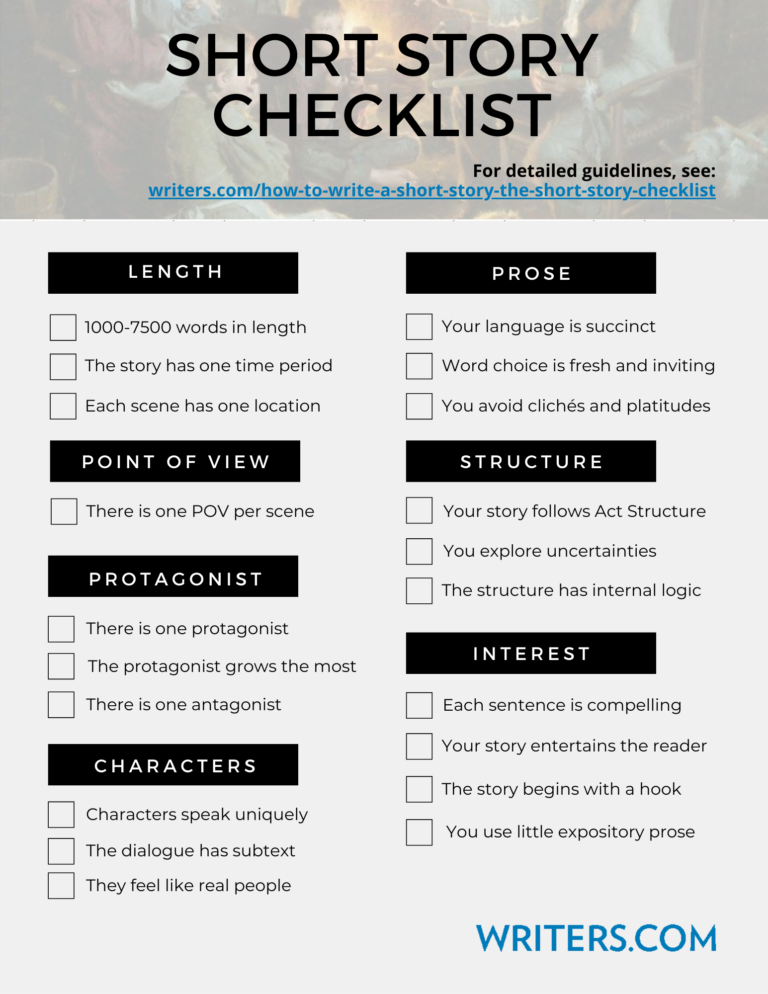
Click to download
How to Write a Short Story: Length and Setting
Your short story is 1000 to 7500 words in length.
The story takes place in one time period, not spread out or with gaps other than to drive someplace, sleep, etc. If there are those gaps, there is a space between the paragraphs, the new paragraph beginning flush left, to indicate a new scene.
Each scene takes place in one location, or in continual transit, such as driving a truck or flying in a plane.
How to Write a Short Story: Point of View
Unless it’s a very lengthy Romance story, in which there may be two Point of View (POV) characters, there is one POV character. If we are told what any character secretly thinks, it will only be the POV character. The degree to which we are privy to the unexpressed thoughts, memories and hopes of the POV character remains consistent throughout the story.
You avoid head-hopping by only having one POV character per scene, even in a Romance. You avoid straying into even brief moments of telling us what other characters think other than the POV character. You use words like “apparently,” “obviously,” or “supposedly” to suggest how non-POV-characters think rather than stating it.
How to Write a Short Story: Protagonist, Antagonist, Motivation
Your short story has one clear protagonist who is usually the character changing most.
Your story has a clear antagonist, who generally makes the protagonist change by thwarting his goals.
(Possible exception to the two short story writing tips above: In some types of Mystery and Action stories, particularly in a series, etc., the protagonist doesn’t necessarily grow personally, but instead his change relates to understanding the antagonist enough to arrest or kill him.)
The protagonist changes with an Arc arising out of how he is stuck in his Flaw at the beginning of the story, which makes the reader bond with him as a human, and feel the pain of his problems he causes himself. (Or if it’s the non-personal growth type plot: he’s presented at the beginning of the story with a high-stakes problem that requires him to prevent or punish a crime.)
The protagonist usually is shown to Want something, because that’s what people normally do, defining their personalities and behavior patterns, pushing them onward from day to day. This may be obvious from the beginning of the story, though it may not become heightened until the Inciting Incident , which happens near the beginning of Act 1. The Want is usually something the reader sort of wants the character to succeed in, while at the same time, knows the Want is not in his authentic best interests. This mixed feeling in the reader creates tension.
The protagonist is usually shown to Need something valid and beneficial, but at first, he doesn’t recognize it, admit it, honor it, integrate it with his Want, or let the Want go so he can achieve the Need instead. Ideally, the Want and Need can be combined in a satisfying way toward the end for the sake of continuity of forward momentum of victoriously achieving the goals set out from the beginning. It’s the encounters with the antagonist that forcibly teach the protagonist to prioritize his Needs correctly and overcome his Flaw so he can defeat the obstacles put in his path.
The protagonist in a personal growth plot needs to change his Flaw/Want but like most people, doesn’t automatically do that when faced with the problem. He tries the easy way, which doesn’t work. Only when the Crisis takes him to a low point does he boldly change enough to become victorious over himself and the external situation. What he learns becomes the Theme.
Each scene shows its main character’s goal at its beginning, which aligns in a significant way with the protagonist’s overall goal for the story. The scene has a “charge,” showing either progress toward the goal or regression away from the goal by the ending. Most scenes end with a negative charge, because a story is about not obtaining one’s goals easily, until the end, in which the scene/s end with a positive charge.
The protagonist’s goal of the story becomes triggered until the Inciting Incident near the beginning, when something happens to shake up his life. This is the only major thing in the story that is allowed to be a random event that occurs to him.
How to Write a Short Story: Characters
Your characters speak differently from one another, and their dialogue suggests subtext, what they are really thinking but not saying: subtle passive-aggressive jibes, their underlying emotions, etc.
Your characters are not illustrative of ideas and beliefs you are pushing for, but come across as real people.
How to Write a Short Story: Prose
Your language is succinct, fresh and exciting, specific, colorful, avoiding clichés and platitudes. Sentence structures vary. In Genre stories, the language is simple, the symbolism is direct, and words are well-known, and sentences are relatively short. In Literary stories, you are freer to use more sophisticated ideas, words, sentence structures and underlying metaphors and implied motifs.
How to Write a Short Story: Story Structure
Your plot elements occur in the proper places according to classical Act Structure so the reader feels he has vicariously gone through a harrowing trial with the protagonist and won, raising his sense of hope and possibility. Literary short stories may be more subtle, with lower stakes, experimenting beyond classical structures like the Hero’s Journey. They can be more like vignettes sometimes, or even slice-of-life, though these types are hard to place in publications.
In Genre stories, all the questions are answered, threads are tied up, problems are solved, though the results of carnage may be spread over the landscape. In Literary short stories, you are free to explore uncertainty, ambiguity, and inchoate, realistic endings that suggest multiple interpretations, and unresolved issues.
Some Literary stories may be nonrealistic, such as with Surrealism, Absurdism, New Wave Fabulism, Weird and Magical Realism . If this is what you write, they still need their own internal logic and they should not be bewildering as to the what the reader is meant to experience, whether it’s a nuanced, unnameable mood or a trip into the subconscious.
Literary stories may also go beyond any label other than Experimental. For example, a story could be a list of To Do items on a paper held by a magnet to a refrigerator for the housemate to read. The person writing the list may grow more passive-aggressive and manipulative as the list grows, and we learn about the relationship between the housemates through the implied threats and cajoling.
How to Write a Short Story: Capturing Reader Interest
Your short story is suspenseful, meaning readers hope the protagonist will achieve his best goal, his Need, by the Climax battle against the antagonist.
Your story entertains. This is especially necessary for Genre short stories.
The story captivates readers at the very beginning with a Hook, which can be a puzzling mystery to solve, an amazing character’s or narrator’s Voice, an astounding location, humor, a startling image, or a world the reader wants to become immersed in.
Expository prose (telling, like an essay) takes up very, very little space in your short story, and it does not appear near the beginning. The story is in Narrative format instead, in which one action follows the next. You’ve removed every unnecessary instance of Expository prose and replaced it with showing Narrative. Distancing words like “used to,” “he would often,” “over the years, he,” “each morning, he” indicate that you are reporting on a lengthy time period, summing it up, rather than sticking to Narrative format, in which immediacy makes the story engaging.
You’ve earned the right to include Expository Backstory by making the reader yearn for knowing what happened in the past to solve a mystery. This can’t possibly happen at the beginning, obviously. Expository Backstory does not take place in the first pages of your story.
Your reader cares what happens and there are high stakes (especially important in Genre stories). Your reader worries until the end, when the protagonist survives, succeeds in his quest to help the community, gets the girl, solves or prevents the crime, achieves new scientific developments, takes over rule of his realm, etc.
Every sentence is compelling enough to urge the reader to read the next one—because he really, really wants to—instead of doing something else he could be doing. Your story is not going to be assigned to people to analyze in school like the ones you studied, so you have found a way from the beginning to intrigue strangers to want to spend their time with your words.
Where to Read and Submit Short Stories
Whether you’re looking for inspiration or want to publish your own stories, you’ll find great literary journals for writers of all backgrounds at this article:
https://writers.com/short-story-submissions
Learn How to Write a Short Story at Writers.com
The short story takes an hour to learn and a lifetime to master. Learn how to write a short story with Writers.com. Our upcoming fiction courses will give you the ropes to tell authentic, original short stories that captivate and entrance your readers.
Rosemary – Is there any chance you could add a little something to your checklist? I’d love to know the best places to submit our short stories for publication. Thanks so much.
Hi, Kim Hanson,
Some good places to find publications specific to your story are NewPages, Poets and Writers, Duotrope, and The Submission Grinder.
“ In Genre stories, all the questions are answered, threads are tied up, problems are solved, though the results of carnage may be spread over the landscape.”
Not just no but NO.
See for example the work of MacArthur Fellow Kelly Link.
[…] How to Write a Short Story: The Short Story Checklist […]
Thank you for these directions and tips. It’s very encouraging to someone like me, just NOW taking up writing.
[…] Writers.com. A great intro to writing. https://writers.com/how-to-write-a-short-story […]
Hello: I started to write seriously in the late 70’s. I loved to write in High School in the early 60’s but life got in the way. Around the 00’s many of the obstacles disappeared. Since then I have been writing more, and some of my work was vanilla transgender stories. Here in 2024 transgender stories have become tiresome because I really don’t have much in common with that mind set.
The glare of an editor that could potentially pay me is quite daunting, so I would like to start out unpaid to see where that goes. I am not sure if a writer’s agent would be a good fit for me. My work life was in the Trades, not as some sort of Academic. That alone causes timidity, but I did read about a fiction writer who had been a house painter.
This is my first effort to publish since the late 70’s. My pseudonym would perhaps include Ahabidah.
Gwen Boucher.
Leave a Comment Cancel Reply
Save my name, email, and website in this browser for the next time I comment.
The 10 Best Short Moral Stories With Valuable Lessons
Stories that have morals and messages behind them are always powerful. In fact, it’s crazy just how powerful a 200 word story can be.
Our last article of short stories became so popular, that we decided to create another list, in which every story has a simple moral behind it.
Table of Contents
The 10 Best Short Moral Stories
Some of these stories are very short and basic. In fact some are so basic they’re most likely featured in children’s books somewhere. However, the strength of the message remains the same.
Here’s some more of the best short moral stories:
1. An Old Man Lived in the Village

An old man lived in the village. He was one of the most unfortunate people in the world. The whole village was tired of him; he was always gloomy, he constantly complained and was always in a bad mood.
The longer he lived, the more bile he was becoming and the more poisonous were his words. People avoided him, because his misfortune became contagious. It was even unnatural and insulting to be happy next to him.
He created the feeling of unhappiness in others.
But one day, when he turned eighty years old , an incredible thing happened. Instantly everyone started hearing the rumour:
“An Old Man is happy today, he doesn’t complain about anything, smiles, and even his face is freshened up.”
The whole village gathered together. The old man was asked:
Villager: What happened to you?
“Nothing special. Eighty years I’ve been chasing happiness, and it was useless. And then I decided to live without happiness and just enjoy life. That’s why I’m happy now.” – An Old Man
Moral of the story:
Don’t chase happiness. Enjoy your life.
2. The Wise Man

People have been coming to the wise man, complaining about the same problems every time. One day he told them a joke and everyone roared in laughter.
After a couple of minutes, he told them the same joke and only a few of them smiled.
When he told the same joke for the third time no one laughed anymore.
The wise man smiled and said:
“You can’t laugh at the same joke over and over. So why are you always crying about the same problem?”
Worrying won’t solve your problems, it’ll just waste your time and energy.
3. The Foolish Donkey
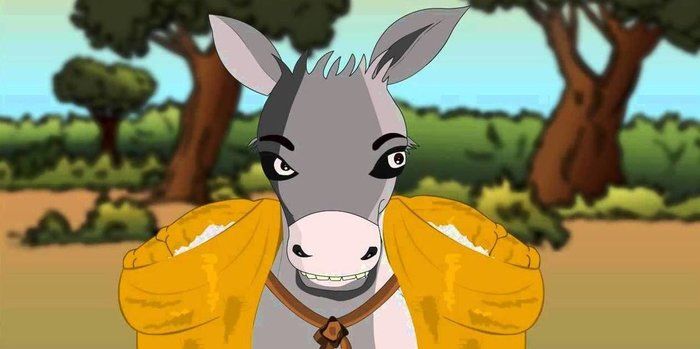
A salt seller used to carry the salt bag on his donkey to the market every day.
On the way they had to cross a stream. One day the donkey suddenly tumbled down the stream and the salt bag also fell into the water. The salt dissolved in the water and hence the bag became very light to carry. The donkey was happy.
Then the donkey started to play the same trick every day.
The salt seller came to understand the trick and decided to teach a lesson to it. The next day he loaded a cotton bag on the donkey.
Again it played the same trick hoping that the cotton bag would be still become lighter.
But the dampened cotton became very heavy to carry and the donkey suffered. It learnt a lesson. It didn’t play the trick anymore after that day, and the seller was happy.
Luck won’t favor always.
4. Having A Best Friend

A story tells that two friends were walking through the desert. During some point of the journey they had an argument, and one friend slapped the other one in the face.
The one who got slapped was hurt, but without saying anything, wrote in the sand;
“Today my best friend slapped me in the face.”
They kept on walking until they found an oasis, where they decided to take a bath. The one who had been slapped got stuck in the mire and started drowning, but the friend saved him. After he recovered from the near drowning, he wrote on a stone;
“Today my best friend saved my life.”
The friend who had slapped and saved his best friend asked him;
“After I hurt you, you wrote in the sand and now, you write on a stone, why?”
The other friend replied;
“When someone hurts us we should write it down in sand where winds of forgiveness can erase it away. But, when someone does something good for us, we must engrave it in stone where no wind can ever erase it.”
Moral of the story:
Don’t value the things you have in your life. But value who you have in your life.
5. The Four Smart Students

One night four college students were out partying late night and didn’t study for the test which was scheduled for the next day. In the morning, they thought of a plan.
They made themselves look dirty with grease and dirt.
Then they went to the Dean and said they had gone out to a wedding last night and on their way back the tire of their car burst and they had to push the car all the way back. So they were in no condition to take the test.
The Dean thought for a minute and said they can have the re-test after 3 days. They thanked him and said they will be ready by that time.
On the third day, they appeared before the Dean. The Dean said that as this was a Special Condition Test, all four were required to sit in separate classrooms for the test. They all agreed as they had prepared well in the last 3 days.
The Test consisted of only 2 questions with the total of 100 Points:
1) Your Name? __________ (1 Points)
2) Which tire burst? __________ (99 Points) Options – (a) Front Left (b) Front Right (c) Back Left (d) Back Right
Take responsibility or you will learn your lesson.
6. The Greedy Lion

It was an incredibly hot day, and a lion was feeling very hungry.
He came out of his den and searched here and there. He could find only a small hare. He caught the hare with some hesitation. “This hare can’t fill my stomach” thought the lion.
As the lion was about to kill the hare, a deer ran that way. The lion became greedy. He thought;
“Instead of eating this small hare, let me eat the big deer.”
He let the hare go and went behind the deer. But the deer had vanished into the forest. The lion now felt sorry for letting the hare off.
A bird in hand is worth two in the bush.
7. Two Friends & The Bear

Vijay and Raju were friends. On a holiday they went walking into a forest, enjoying the beauty of nature. Suddenly they saw a bear coming at them. They became frightened.
Raju, who knew all about climbing trees, ran up to a tree and climbed up quickly. He didn’t think of Vijay. Vijay had no idea how to climb the tree.
Vijay thought for a second. He’d heard animals don’t prefer dead bodies, so he fell to the ground and held his breath. The bear sniffed him and thought he was dead. So, it went on its way.
Raju asked Vijay;
“What did the bear whisper into your ears?”
Vijay replied, “The bear asked me to keep away from friends like you” …and went on his way.
A friend in need is a friend indeed.
8. The Struggles of Our Life

Once upon a time a daughter complained to her father that her life was miserable and that she didn’t know how she was going to make it.
She was tired of fighting and struggling all the time. It seemed just as one problem was solved, another one soon followed.
Her father, a chef, took her to the kitchen. He filled three pots with water and placed each on a high fire.
Once the three pots began to boil, he placed potatoes in one pot, eggs in the second pot and ground coffee beans in the third pot. He then let them sit and boil, without saying a word to his daughter.
The daughter, moaned and impatiently waited, wondering what he was doing. After twenty minutes he turned off the burners.
He took the potatoes out of the pot and placed them in a bowl. He pulled the eggs out and placed them in a bowl. He then ladled the coffee out and placed it in a cup.
Turning to her, he asked. “Daughter, what do you see?”
“Potatoes, eggs and coffee,” she hastily replied.
“Look closer” he said, “and touch the potatoes.” She did and noted that they were soft.
He then asked her to take an egg and break it. After pulling off the shell, she observed the hard-boiled egg.
Finally, he asked her to sip the coffee. Its rich aroma brought a smile to her face.
“Father, what does this mean?” she asked.
He then explained that the potatoes, the eggs and coffee beans had each faced the same adversity-the boiling water. However, each one reacted differently. The potato went in strong, hard and unrelenting, but in boiling water, it became soft and weak.
The egg was fragile, with the thin outer shell protecting its liquid interior until it was put in the boiling water. Then the inside of the egg became hard.
However, the ground coffee beans were unique. After they were exposed to the boiling water, they changed the water and created something new.
“Which one are you?” he asked his daughter.
“When adversity knocks on your door, how do you respond? Are you a potato, an egg, or a coffee bean?”
In life, things happen around us, things happen to us, but the only thing that truly matters is how you choose to react to it and what you make out of it. Life is all about leaning, adopting and converting all the struggles that we experience into something positive.
9. The Fox & The Grapes

One afternoon a fox was walking through the forest and spotted a bunch of grapes hanging from over a lofty branch.
“Just the thing to quench my thirst,” he thought.
Taking a few steps back, the fox jumped and just missed the hanging grapes. Again the fox took a few paces back and tried to reach them but still failed.
Finally, giving up, the fox turned up his nose and said, “They’re probably sour anyway,” and proceeded to walk away.
Moral of the story:
It’s easy to despise what you can’t have.
10. The Lion & The Poor Slave

A slave, ill-treated by his master, runs away to the forest. There he comes across a lion in pain because of a thorn in his paw. The slave bravely goes forward and removes the thorn gently.
The lion without hurting him goes away.
Some days later, the slave’s master comes hunting to the forest and catches many animals and cages them. The slave is spotted by the masters’ men who catch him and bring him to the cruel master.
The master asks for the slave to be thrown into the lion’s cage.
The slave is awaiting his death in the cage when he realizes that it is the same lion that he had helped. The slave rescued the lion and all other caged animals.
One should help others in need, we get the rewards of our helpful acts in return.
Here’s a quick recap on the 10 best short moral stories:
- An old man lived in the village
- The wise man
- The foolish donkey
- Having a best friend
- The four smart students
- The greedy lion
- The two friends & the bear
- The struggles of our life
- The fox & the grapes
- The lion & the poor slave
If you haven’t seen our original article, with slightly more detailed inspirational short stories , check it out!
Do you have any other favorite short moral stories? Leave a comment below.
The 10 best motivational speakers in the world.
Dan Western is the founder of Wealthy Gorilla . Dan has been running Wealthy Gorilla and studying self-development, personal finance, and investment for the last 7 years. To this day, Wealthy Gorilla has become one of the fastest growing wealth infotainment sites in the world; with over 300 million views worldwide. Dan doesn't use personal social media anymore, so you won't be able to find him on Instagram, or Twitter.
10 Comments
Apr 7, 2019 at 12:40 pm
An old man lived in the village is a wonderful story. I like it very much. thanks
Jun 14, 2019 at 11:20 am
The foolish donkey is wonderful and all stories good but i like it
Jul 17, 2019 at 3:03 pm
I really enjoyed your entire list but my favorite of this list is the one about the egg, potatoe, and coffee. Awesome story that is very impactful.
Nov 22, 2019 at 2:36 am
Foolish donkey this story I like that and I have learn something from these stories thanks uploaded on net its was so inspection stories to people’s
Dec 13, 2019 at 2:08 pm
I like the story an old man lived in the village thank you for giving this type of story
Aqsa farhat
Feb 29, 2020 at 10:54 am
All the stories were nice and these stories reminds me about my childhood thank you for making such meaningful stories
Pattada praveen kumar
Apr 14, 2020 at 9:57 am
The fox & the grapes its really everyone thinking like
Bhim Maya subba
Nov 13, 2020 at 1:55 pm
Mine is about ( The blind girl ). Since I have read that book before but I am very glad that I got another chance to read that same book. Actually this story is one of my favorite of all time.
Ramel Sasuke Sampang
Nov 14, 2020 at 5:31 am
My favorite is the potato, egg, and coffee beans! It will help me with future problems. 😀
Marry Walker
Nov 20, 2020 at 12:40 pm
Being a writer, I love to read stories and books. And this blog includes the best short moral stories. I like these all stories and i will share it definitely. Keep writing!
Your email address will not be published. Required fields are marked *

Who are the best motivational speakers of all time?
Motivational speakers have had an enormous impact on my life, and millions of others, no matter what their personal situation in life may be.
Their words are so powerful and inspirational, you just have to listen to their stuff on a daily basis. So it brings me to this post.
I’ve been enjoying a lot of motivational videos recently, have been creating my own, and have ended up listening to a lot of wonderful speeches.
Top 10 Best Motivational Speakers
But who are the best motivational speakers in the world?
Here’s my list of the top 10 motivational speakers in the world.
These are the people you need to be following, listening to and watching on YouTube. They have transformed many people’s lives including mine.
10. Nick Vujicic

Nick Vujicic was born on December 4th 1982 in Melbourne, Australia. Vujicic was born with Tetra-Amelia syndrome, a very rare disorder whereby someone is born with an absence of all four limbs.
This no doubt ably, made things incredibly tough for Nick growing up, as he struggled both mentally and physically.
It led to him founding his very own non-profit organization called ‘Life Without Limbs’ . Nick Vujicic is a true inspiration to us all, and if you’ve watched some of his motivational speeches on YouTube, you’ll realize just how much he’s been able to adapt to a life without limbs.
Many people with this disorder might not be willing to work hard in order to truly push their abilities.
He can type 43 words a minute on a computer. That’s right, you heard me correctly. This is a guy who has an absence of all four limbs, but can type 43 words per minute on a computer.
I encourage you to watch some of his videos on YouTube, and see exactly what I’m talking about.
“It’s a lie to think you’re not good enough. It’s a lie to think you’re not worth anything.” – nick Vujicic
9. Brian Tracy

Brian Tracy was born on January 5th 1944 in Vancouver, Canada, and is the CEO of Brian Tracy International , a company that specifically sets out to help individuals and organizations develop, train and grow.
Brian’s ultimate goal is to help other people achieve their goals more efficiently and be able to achieve their full potential.
That definitely sets the foundation for being one of the best motivational speakers in the world.
His lifetime achievements are phenomenal, consulting huge numbers of businesses, hosting huge numbers of seminars and conducting years and years of research in Business, Economics, Psychology and Philosophy.
There’s no more to say other than the title given on his website: Professional Speaker, Best Selling Author, Entrepreneur and Success Expert. Check out some of the best Brian Tracy quotes .
“No one lives long enough to learn everything they need to learn starting from scratch. To be successful, we absolutely, positively have to find people who have already paid the price to learn the things that we need to learn to achieve our goals.” – Brian Tracy
8. Robin Sharma

Robin Sharma was born in 1964 in Nepal, and straight out of the Dalhousie University School of Law, became a professional lawyer. But he went much further in his career than being a fully qualified and successful lawyer.
Sharma has written a total of 15 published books, from 1995 – 2011, on the subjects of self-help and leadership. One of his most popular books written; ‘The Monk Who Sold his Ferrari’ , has sold over 5 million copies worldwide.
The book is all about a character called Julian, who decides to sell his home and Ferrari to go on a spiritual journey, after being the victim to a sudden heart attack.
Some may say that Robin Sharma’s more of a motivational author rather than speaker, but he deserves to be on this list. He’s written 12 global best sellers, and is an expert author in the world of leadership and self development.
“Dreamers are mocked as impractical. The truth is they are the most practical, as their innovations lead to progress and a better way of life for all of us.” – Robin S. Sharma
7. Wayne Dyer

Dr. Wayne Dyer was born on May 10th 1940 in Detroit, and spent the majority of his childhood in an orphanage.
Dyer was in the U.S Navy after graduating high school, from 1958 to 1962. He then received his degree in counselling, a profession that he chose to work in for a while before taking it one step further.
Dyer left his teaching job and started pursuing a career in motivational speaking, holding various lectures across the states and becoming an incredibly popular author.
The first book that Dyer ever wrote has now had over 35 million copies sold and he’s proceeded to continue with his lecture tours, release various audio tapes and publish a regular stream of books .
“Passion is a feeling that tells you: this is the right thing to do. Nothing can stand in my way. It doesn’t matter what anyone else says. This feeling is so good that it cannot be ignored. I’m going to follow my bliss and act upon this glorious sensation of joy.” – Wayne Dyer
6. Zig Ziglar

Zig Ziglar was born on November 6th, 1926 in Alabama, and passed away on November 28th in 2012.
Ziglar has 11 siblings, and at the age of five years old, his father died of a stroke, and his sister passed away two days later. Zig actually served in the army from 1935 – 1946 during World War II.
Ziglar met his wife Jean when he was just 17 years old, and after the war began to work as a salesman for many different companies, eventually becoming the vice president for the Automotive Performance company .
He started taking part in motivational seminars, and also wrote his first book in 1975 titled: ‘See You at the Top’ . This was the first of at least 15 books he’d written during the period of 1975 and 2012.
A lot of wisdom has come from Zig Ziglar over the years and he is definitely one of the best motivational speakers in the world.
“You were designed for accomplishment, engineered for success, and endowed with the seeds of greatness.” – Zig Ziglar
5. Arnold Schwarzenegger

Arnold Schwarzenegger was born on July 30th 1947, in Austria. We all know him as the world famous professional bodybuilding champion, and there’s a very inspirational story behind Arnie’s bodybuilding success.
Schwarzenegger served in the Austrian army at the age of 18 years old for 1 year, which at the time was compulsory for all 18-year-old males.
During this time, he would still manage to fit in his workouts between all the training and drills, whilst most people were resting. He snuck out of the camp to compete in the Junior Mr. Europe contest , which he ended up winning.
Arnold’s discipline towards his training was incredible, and the fact that he was willing to disobey the rules of the army and sneak out of the camp to compete in the contest, just goes to show how badly he wanted it.
Nowadays, he’s an inspiration to many bodybuilders and a great source of motivation for anyone wanting to be successful.
“For me life is continuously being hungry. The meaning of life is not simply to exist, to survive, but to move ahead, to go up, to achieve, to conquer.” – Arnold Schwarzenegger
4. Jim Rohn

Jim Rohn was born September 17th, 1930 in Yakima, Washington, and passed away on December 5th, 2009. He was a very successful entrepreneur, at one time being a Vice President of a very successful sales company, Nutri-Bio.
However, after the company eventually went out of business, he was invited to speak at a meeting of one of his clubs.
After this meeting, he was invited to speak at many other events and began making a name for himself. Rohn was a wise businessman and managed to impart much of this wisdom to others.
He’s definitely earned the right to be on this list of the best motivational speakers in the world.
“If you don’t design your own life plan, chances are you’ll fall into someone else’s plan. And guess what they have planned for you? Not much.” – Jim Rohn
3. Les Brown

Les Brown was born on February 17th, 1945 in Miami, Florida. He was adopted by Mamie Brown, and whilst in grade school, was declared “educably mentally retarded” .
Despite this and the emotional issues, it brought upon him; he was encouraged by others to continue to learn and be the best he could be. Leading him to unlock his full potential.
Les is another motivational speaker who is incredibly popular among the motivational video compilations that others create. Because his speeches are so deep and meaningful that they really get through to people.
His top-selling books: ‘It’s Not over until You Win!’ and ‘Live Your Dreams’ are truly inspirational and well worth the read.
“When life knocks you down, try to land on your back. Because if you can look up, you can get up. Let your reason get you back up.” – Les Brown
2. Tony Robbins

Tony Robbins was born on February 29th, 1960 in Los Angeles. His life at home when he was young was described by him as abusive and chaotic. It was because of this that he left home at the age of 17.
Originally when starting out in the world of motivational speaking, Robbins was promoting seminars for Jim Rohn. He later decided to begin his own journey by hosting his own seminars.
Tony has affected and changed so many people’s lives in a positive way through his seminars, motivational speeches, inspirational quotes and best-selling books.
Search for him on YouTube and several videos will pop up showing him change someone’s life.
The favorites of mine that I’ve watched, are where he cures a young man’s stutter in 7 minutes and saves another guy’s marriage in 8.
“One reason so few of us achieve what we truly want is that we never direct our focus; we never concentrate our power. Most people dabble their way through life, never deciding to master anything in particular.” – Tony Robbins
1. Eric Thomas

Eric Thomas, born and raised in Detroit, was homeless at the age of 16 years old. But Eric decided that he wanted to make a better life for himself, to become someone with a life he could be proud of.
E.T did just that, and you can now check out powerful advice from Eric Thomas on YouTube. Including his “Thank God It’s Monday” series.
He also managed to get the education he missed out on whilst he was homeless and pushed himself further to achieve all the qualifications he dreamed of being able to achieve.
Eric Thomas has become one of the best motivational speakers in the world. His YouTube videos are legendary and his best-selling books have taken in millions of dollars in revenue.
E.T’s speeches are so popular, that you’ll find he’s featured in roughly 90% of the motivational videos that others create and upload to YouTube, using compilations of clips, speeches, and music.
“When you want to succeed as bad as you want to breathe, then you’ll be successful.” – Eric Thomas
I hope you enjoyed this list of the top 10 best motivational speakers in the world. Many of these speakers are featured within some of the videos we included in our new list of ultimate gym motivation . Take a look and see what you think.
Here’s a quick recap on the list of the best motivational speakers in the world::
- Eric Thomas
- Tony Robbins
- Arnold Schwarzenegger
- Dr. Wayne Dyer
- Robin Sharma
- Brian Tracy
- Nick Vujicic
Who’s your favorite of the 10 best motivational speakers? Do you still agree with the current order of this list? Leave a comment below.
The 10 Most Inspirational Short Stories I’ve Heard

Short Inspirational stories are powerful reads;
The great thing about them is that they’re so easy to digest, and there’s always a moral at the end of the story.
Whether they’re true stories or not is another thing, as many of them are legends supposedly hundreds of years old.
However, the stories that I’m talking about are so powerful and inspirational that many of them really do get you thinking and even leave you speechless at times.
The 10 Best Inspirational Short Stories
I’ve been reading plenty of these short stories in the past couple of weeks and found the lessons behind them truly wonderful. So I’ve decided to write out this article highlighting the 10 most inspirational short stories I’ve heard.
Next to the subheadings, in brackets, I’ve put what the story’s lesson is all about, with a short description of the moral of the story at the end of each section.
10. The Elephant Rope (Belief)

A gentleman was walking through an elephant camp, and he spotted that the elephants weren’t being kept in cages or held by the use of chains.
All that was holding them back from escaping the camp, was a small piece of rope tied to one of their legs.
As the man gazed upon the elephants, he was completely confused as to why the elephants didn’t just use their strength to break the rope and escape the camp. They could easily have done so, but instead, they didn’t try to at all.
Curious and wanting to know the answer, he asked a trainer nearby why the elephants were just standing there and never tried to escape.
The trainer replied;
“when they are very young and much smaller we use the same size rope to tie them and, at that age, it’s enough to hold them. As they grow up, they are conditioned to believe they cannot break away. They believe the rope can still hold them, so they never try to break free.”
The only reason that the elephants weren’t breaking free and escaping from the camp was that over time they adopted the belief that it just wasn’t possible.
No matter how much the world tries to hold you back, always continue with the belief that what you want to achieve is possible. Believing you can become successful is the most important step in actually achieving it.
9. Thinking Out of the Box (Creative Thinking)

In a small Italian town, hundreds of years ago, a small business owner owed a large sum of money to a loan-shark. The loan-shark was a very old, unattractive looking guy that just so happened to fancy the business owner’s daughter.
He decided to offer the businessman a deal that would completely wipe out the debt he owed him. However, the catch was that we would only wipe out the debt if he could marry the businessman’s daughter.
Needless to say, this proposal was met with a look of disgust.
The loan-shark said that he would place two pebbles into a bag, one white and one black.
The daughter would then have to reach into the bag and pick out a pebble. If it was black, the debt would be wiped, but the loan-shark would then marry her. If it was white, the debt would also be wiped, but the daughter wouldn’t have to marry the loan-shark.
Standing on a pebble-strewn path in the businessman’s garden, the loan-shark bent over and picked up two pebbles.
Whilst he was picking them up, the daughter noticed that he’d picked up two black pebbles and placed them both into the bag.
He then asked the daughter to reach into the bag and pick one.
The daughter naturally had three choices as to what she could have done:
- Refuse to pick a pebble from the bag.
- Take both pebbles out of the bag and expose the loan-shark for cheating.
- Pick a pebble from the bag fully well knowing it was black and sacrifice herself for her father’s freedom.
She drew out a pebble from the bag, and before looking at it ‘accidentally’ dropped it into the midst of the other pebbles. She said to the loan-shark;
“Oh, how clumsy of me. Never mind, if you look into the bag for the one that is left, you will be able to tell which pebble I picked.”
The pebble left in the bag is obviously black, and seeing as the loan-shark didn’t want to be exposed, he had to play along as if the pebble the daughter dropped was white, and clear her father’s debt.
It’s always possible to overcome a tough situation throughout of the box thinking, and not give in to the only options you think you have to pick from.
8. The Group of Frogs (Encouragement)

As a group of frogs was traveling through the woods, two of them fell into a deep pit. When the other frogs crowded around the pit and saw how deep it was, they told the two frogs that there was no hope left for them.
However, the two frogs decided to ignore what the others were saying and they proceeded to try and jump out of the pit .
Despite their efforts, the group of frogs at the top of the pit were still saying that they should just give up. That they would never make it out.
Eventually, one of the frogs took heed to what the others were saying and he gave up, falling down to his death. The other frog continued to jump as hard as he could. Again, the crowd of frogs yelled at him to stop the pain and just die.
He jumped even harder and finally made it out. When he got out, the other frogs said, “Did you not hear us?”
The frog explained to them that he was deaf. He thought they were encouraging him the entire time.
People’s words can have a big effect on other’s lives. Think about what you say before it comes out of your mouth. It might just be the difference between life and death.
7. A Pound of Butter (Honesty)

There was a farmer who sold a pound of butter to a baker. One day the baker decided to weigh the butter to see if he was getting the right amount, which he wasn’t. Angry about this, he took the farmer to court.
The judge asked the farmer if he was using any measure to weight the butter. The farmer replied, “Honor, I am primitive. I don’t have a proper measure, but I do have a scale.”
The judge asked, “Then how do you weigh the butter?”
The farmer replied;
“Your Honor, long before the baker started buying butter from me, I have been buying a pound loaf of bread from him. Every day when the baker brings the bread, I put it on the scale and give him the same weight in butter. If anyone is to be blamed, it is the baker.”
In life, you get what you give. Don’t try and cheat others.
6. The Obstacle In Our Path (Opportunity)

In ancient times, a King had a boulder placed on a roadway. He then hid himself and watched to see if anyone would move the boulder out of the way. Some of the king’s wealthiest merchants and courtiers came by and simply walked around it.
Many people loudly blamed the King for not keeping the roads clear, but none of them did anything about getting the stone out of the way.
A peasant then came along carrying a load of vegetables. Upon approaching the boulder, the peasant laid down his burden and tried to push the stone out of the road. After much pushing and straining, he finally succeeded.
After the peasant went back to pick up his vegetables, he noticed a purse lying in the road where the boulder had been.
The purse contained many gold coins and a note from the King explaining that the gold was for the person who removed the boulder from the roadway.
Every obstacle we come across in life gives us an opportunity to improve our circumstances , and whilst the lazy complain, the others are creating opportunities through their kind hearts, generosity, and willingness to get things done.
5. The Butterfly (Struggles)

A man found a cocoon of a butterfly.
One day a small opening appeared. He sat and watched the butterfly for several hours as it struggled to force its body through that little hole.
Until it suddenly stopped making any progress and looked like it was stuck.
So the man decided to help the butterfly. He took a pair of scissors and snipped off the remaining bit of the cocoon. The butterfly then emerged easily, although it had a swollen body and small, shriveled wings.
The man didn’t think anything of it and sat there waiting for the wings to enlarge to support the butterfly. But that didn’t happen. The butterfly spent the rest of its life unable to fly, crawling around with tiny wings and a swollen body.
Despite the kind heart of the man , he didn’t understand that the restricting cocoon and the struggle needed by the butterfly to get itself through the small opening; were God’s way of forcing fluid from the body of the butterfly into its wings. To prepare itself for flying once it was out of the cocoon.
Our struggles in life develop our strengths . Without struggles, we never grow and never get stronger, so it’s important for us to tackle challenges on our own, and not be relying on help from others.
4. Control Your Temper (Anger)
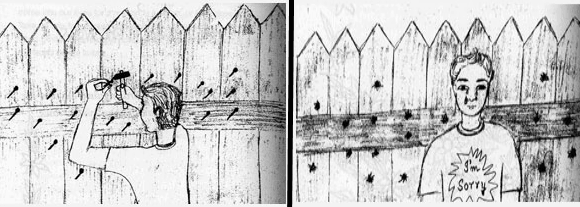
There once was a little boy who had a very bad temper. His father decided to hand him a bag of nails and said that every time the boy lost his temper, he had to hammer a nail into the fence.
On the first day, the boy hammered 37 nails into that fence.
The boy gradually began to control his temper over the next few weeks, and the number of nails he was hammering into the fence slowly decreased.
He discovered it was easier to control his temper than to hammer those nails into the fence.
Finally, the day came when the boy didn’t lose his temper at all. He told his father the news and the father suggested that the boy should now pull out a nail every day he kept his temper under control.
The days passed and the young boy was finally able to tell his father that all the nails were gone. The father took his son by the hand and led him to the fence.
“you have done well, my son, but look at the holes in the fence. The fence will never be the same. When you say things in anger, they leave a scar just like this one. You can put a knife in a man and draw it out. It won’t matter how many times you say I’m sorry, the wound is still there.”
Control your anger, and don’t say things to people in the heat of the moment, that you may later regret . Some things in life, you are unable to take back.
3. The Blind Girl (Change)

There was a blind girl who hated herself purely for the fact she was blind. The only person she didn’t hate was her loving boyfriend, as he was always there for her. She said that if she could only see the world, she would marry him.
One day, someone donated a pair of eyes to her – now she could see everything , including her boyfriend. Her boyfriend asked her, “now that you can see the world, will you marry me?”
The girl was shocked when she saw that her boyfriend was blind too, and refused to marry him. Her boyfriend walked away in tears, and later wrote a letter to her saying:
“Just take care of my eyes dear.”
When our circumstances change, so does our mind. Some people may not be able to see the way things were before, and might not be able to appreciate them . There are many things to take away from this story, not just one.
This is one of the inspirational short stories that left me speechless.
2. Puppies for Sale (Understanding)

A shop owner placed a sign above his door that said: “Puppies For Sale.”
Signs like this always have a way of attracting young children, and to no surprise, a boy saw the sign and approached the owner;
“How much are you going to sell the puppies for?” he asked.
The store owner replied, “Anywhere from $30 to $50.”
The little boy pulled out some change from his pocket. “I have $2.37,” he said. “Can I please look at them?”
The shop owner smiled and whistled. Out of the kennel came Lady, who ran down the aisle of his shop followed by five teeny, tiny balls of fur.
One puppy was lagging considerably behind. Immediately the little boy singled out the lagging, limping puppy and said, “What’s wrong with that little dog?”
The shop owner explained that the veterinarian had examined the little puppy and had discovered it didn’t have a hip socket. It would always limp. It would always be lame.
The little boy became excited. “That is the puppy that I want to buy.”
The shop owner said, “No, you don’t want to buy that little dog. If you really want him, I’ll just give him to you.”
The little boy got quite upset. He looked straight into the store owner’s eyes, pointing his finger, and said;
“I don’t want you to give him to me. That little dog is worth every bit as much as all the other dogs and I’ll pay full price. In fact, I’ll give you $2.37 now, and 50 cents a month until I have him paid for.”
The shop owner countered, “You really don’t want to buy this little dog. He is never going to be able to run and jump and play with you like the other puppies.”
To his surprise, the little boy reached down and rolled up his pant leg to reveal a badly twisted, crippled left leg supported by a big metal brace. He looked up at the shop owner and softly replied, “Well, I don’t run so well myself, and the little puppy will need someone who understands!”
1. Box Full of Kisses (Love)

Some time ago, a man punished his 3-year-old daughter for wasting a roll of gold wrapping paper. Money was tight and he became infuriated when the child tried to decorate a box to put under the Christmas tree.
Nevertheless, the little girl brought the gift to her father the next morning and said, “This is for you, Daddy.”
The man became embarrassed by his overreaction earlier, but his rage continue when he saw that the box was empty. He yelled at her; “Don’t you know, when you give someone a present, there is supposed to be something inside?”
The little girl looked up at him with tears in her eyes and cried;
“Oh, Daddy, it’s not empty at all. I blew kisses into the box. They’re all for you, Daddy.”
The father was crushed. He put his arms around his little girl, and he begged for her forgiveness.
Only a short time later, an accident took the life of the child.
Her father kept the gold box by his bed for many years and, whenever he was discouraged, he would take out an imaginary kiss and remember the love of the child who had put it there.
Love is the most precious gift in the world.

Summary of the 10 Best Inspirational Stories
Here’s a quick summary of the 10 best short inspirational stories:
- Box Full of Kisses (Love)
- Puppies for Sale (Understanding)
- The Blind Girl (Change)
- Control Your Temper (Anger)
- The Butterfly (Struggles)
- The Obstacle in Our Path (Opportunity)
- A Pound of Butter (Honesty)
- The Group of Frogs (Encouragement)
- Thinking Out of the Box (Creative Thinking)
- The Elephant Rope (Belief)
Thanks for reading these inspirational short stories. Some of them left me speechless for a minute or two, and it really does make us think.
If you know of any other inspirational short stories that you think should be featured on the list, then let me know in the comments below or drop me an email and I’ll feature them in part two later on in the year.
Which are your favorite inspirational short stories? Leave a comment below.
Top 20 best personal development authors of all time.

Ever wanted to start reading self-development books, but you’re not sure who the best personal development authors to follow are?
You’re in luck…
I’m about to give you the names of what I believe to be the top 20 best self-development authors to be reading up on. These are names to remember when you’re looking for your next book to buy.
Top 20 Best Personal Development Authors
Here are, in no particular order, the names of the 20 best authors to start reading up on. I would have loved to include a few other names on this list, but the top 20 is what it is!
1. Jack Canfield

Jack Canfield is the legend behind the ‘Chicken Soup for the Soul’ series; one of the most popular self-development book series of all time.
Over 250+ books have been published by the company, and Canfield has gone on to become a leading motivational speaker and trainer.
2. Napoleon Hill

Napoleon Hill is the author behind the notorious ‘Think & Grow Rich’, one of the most popular self-development books of all time.
Hill teaches the principles of attaining any riches you desire in life, and there is so much valuable information within this book, that it’ll always be remembered.
3. Dale Carnegie

Another self-development author you have to check out, and one you’ve probably already heard of, is Dale Carnegie. Carnegie lived from 1888 to 1955, and within his life, published a considerable number of self-help books.
Two of those books, specifically the best selling ones, were ‘How to Win Friends & Influence People’ and ‘How to Stop Worrying & Start Living’.
4. Robert B. Cialdini

You probably know Cialdini as the author of ‘Influence: The Psychology of Persuasion’. This book is highly regarded as one of the best self-development books of all time, as well as one of the best psychology books to read.
5. Tim Ferriss

If you’re not following Tim Ferriss , I don’t know what you’re doing. There are four best selling books that every Tim Ferriss fan will have read, and they’ve helped change the lives of millions.
Those four books are:
- The Four Hour Work Week
- The Four Hour Body
- Tools For Titans
- Tribe of Mentors
6. Dr. Wayne Dyer

Sadly, Wayne Dyer passed away several years ago. He was an American philosopher, self-help author and motivational speaker. Dyer wrote over 40 books in the field of personal development, and they have sold in tens of millions.
7. John C. Maxwell

John Maxwell is an American author, speaker and pastor. He focuses solely on leadership, and training other to become wise and wonderful leaders.
Maxwell has written a ton of incredible books, however these are some the most popular books he’s written:
- The 21 Irrefutable Laws of Leadership
- Developing The Leader Within You
- The 15 Invaluable Laws of Growth
- How Successful People Think
- Failing Forward
8. Tony Robbins
Tony Robbins , what a guy! Tony has helped people all over the world to transform their lives, and there’s so much wisdom we can all gain from listening to his speeches, and reading his content.
If you want to learn more about Tony Robbins and his work, you can check out these books:
- Awaken the Giant Within
- Unlimited Power
- Unshakeable
9. Paulo Coelho
You probably know Paulo Coelho for his best selling book, ‘The Alchemist’. Coelho is a best selling author, lyricist and novelist, and has received many awards for his work over the years.
The Alchemist is definitely a book you should read if you’re an ambitious individual trying to pursue your dreams and overcome any obstacles in your way.
10. Deepak Chopra

Deepak Chopra is an American author, public speaker, alternative medicine advocate, and a prominent figure in the New Age movement.
Chopra has become one of the most influential figures in the area of spiritual healing and alternative medicine. Some of his best selling books you should be adding to your reading list are:
- Re-inventing the Body, Resurrecting the Soul
- Creating Affluence
- The Seven Spiritual Laws of Success
11. Peter F. Drucker

Peter Drucker was an Austrian-born American management consultant, educator, and author, whose writings contributed to the philosophical and practical foundations of the modern business corporation.
You probably know him as the author behind ‘Managing Oneself’, and if you don’t, then you should.
12. Martha Beck

Martha Nibley Beck is an American sociologist, life coach, best-selling author, and speaker who travels the world helping people achieve personal and professional goals.
Some of Martha’s most popular books are:
- Finding Your Own North Star
- Find Your Way In A Wild New World
- The 4-Day Win
13. Stephen R. Covey

I first encountered Stephen Covey’s work when I purchased ‘The 7 Habits of Highly Effective People’, which at the time had sold over 15 million copies!
Covey was an American educator, speaker and author. He sadly passed away 5 years ago, but his work has lived on to be some of the best reading material anybody could ever purchase.
14. Brian Tracy
Brian Tracy is a Canadian-born American motivational public speaker and self-development author. He is the author of over 70 books that have been translated into dozens of languages.
Some of his most notorious books are:
- No Excuses: The Power of Discipline
- Eat That Frog!
15. Les Brown
Les Brown is one of my favorite motivational speakers of all time. Les was labelled educable mentally retarded when he was younger, and was born on the floor of an abandoned building.
Some of his most popular and best selling books are ‘Live Your Dreams’ and ‘It’s Not Over Until You Win’.
16. Jim Rohn
Emanuel James “Jim” Rohn was an American entrepreneur, author and motivational speaker. He was responsible for changing many people’s lives, and even mentored Tony Robbins once upon a time.
These are some of the most popular self-development books by Jim Rohn:
- 7 Strategies for Wealth & Happiness
- My Philosophy for Successful Living
- The Keys to Success
17. Gary Keller

Gary Keller is an American entrepreneur and best-selling author. He is the founder of Keller Williams Realty International, which is the largest real estate company in the world by agent count.
You’ve probably heard Keller’s name come up when people talk about ‘The ONE Thing’, his best selling self-help book.
18. Gabrielle Bernstein

Gabrielle Bernstein is an American motivational speaker, life coach, and author. Bernstein teaches primarily from the metaphysical text A Course In Miracles.
Some of here most popular books are:
- Miracles Now
- Spirit Junkie
- May Cause Miracles
- The Universe Has Your Back
19. Brendan Burchard

Brendon Burchard is an American author on motivation and the use of digital and affiliate marketing to sell “info products” based on whatever expertise a person has.
He is most commonly known for his book: The Motivation Manifesto, however he has written several other useful and recommended books on the subject of motivation, such as:
- The Millionaire Messenger
- Life’s Golden Ticket
20. Joel Osteen

Joel Scott Osteen is an American preacher and televangelist. He is the Senior Pastor of Lakewood Church, in Houston, Texas. Osteen’s televised sermons are seen by over 7 million viewers weekly and over 20 million monthly in over 100 countries.
Some of his most popular books are:
- Think Better, Live Better Study Guide
- The Power of I Am
- Fresh Start
That concludes the list of the best personal development authors of all time:
- Jack Canfield
- Napoleon Hill
- Dale Carnegie
- Robert B. Cialdini
- John C. Maxwell
- Anthony Robbins
- Paulo Coelho
- Deepak Chopra
- Peter F. Drucker
- Martha Beck
- Stephen R. Covey
- Gary Keller
- Gabrielle Bernstein
- Brendan Burchard
- Joel Osteen
Who are your favorite personal development authors? Leave a comment below.
Latest posts.

Max Holloway Net Worth
What is Max Holloway’s net worth? Introduction Max Holloway is a Polynesian American mixed martial artist, former UFC Featherweight Champion...

DeAndre Hopkins Net Worth
What is DeAndre Hopkins’ net worth? Introduction As of , DeAndre Hopkins’ net worth is roughly . DeAndre Hopkins is...

Young Dolph Net Worth
What is Young Dolph’s net worth? Introduction As of , Young Dolph’s net worth is estimated to be . Young...

Baker Mayfield Net Worth
What is Baker Mayfield’s net worth? Introduction Baker Mayfield is an American football quarterback for the Tampa Bay Buccaneers of...

Luke Kuechly Net Worth
What is Luke Kuechly’s net worth? Introduction Luke Kuechly is a former American football linebacker for the Carolina Panthers of...

Mobb Deep Net Worth
What was Mobb Deep’s net worth? Introduction Mobb Deep was an American hip-hop duo from Queens, New York. The group...

Jesse Jane Net Worth
What is Jesse Jane’s net worth? Introduction Jesse Jane was an American adult film actress and model from Texas. Jane...

Emily Fernandez Net Worth
What is Emily Fernandez’s net worth? Introduction As of , Emily Fernandez’s net worth is roughly . Emily Fernandez is...

Leighton Vander Esch Net Worth
What is Leighton Vander Esch’s net worth? Introduction Leighton Vander Esch is a former American football linebacker who played his...

Grant Hill Net Worth
What is Grant Hill’s net worth? Introduction As of , Grant Hill’s net worth is . Grant Hill is a...

The 30 Richest People in the World

The 50 Richest Rappers in the World

The 50 Richest Singers in the World

The 50 Richest Actors in the World

The 50 Richest Athletes in the World

Jeff Bezos Net Worth

The 50 Richest DJs in the World

- How to Cite
- Language & Lit
- Rhyme & Rhythm
- The Rewrite
- Search Glass
Ideas for Story Morals
The moral of a story is the principle or lesson it teaches. Although many stories have subtle morals, clearly defined moral lessons are almost always contained in fables, myths and storybooks for young children. If you're going to be writing a story for children, or if your child is writing a story, you could start out with an idea for a moral and build the story around it.
Don't Judge a Book by Its Cover
One idea for a moral to write into your story is "Don't judge a book by its cover." This means that appearances can be deceiving, and you shouldn't base your opinion of someone on how they look. What's more important is what people have inside and how they behave. In a children's story, this could be expressed by having a character who looks mean or scary but turns out to be kind and good. Or the story could include a character who looks beautiful but is uncaring and selfish.
Look Before You Leap
"Look before you leap" is a saying that means make sure you're aware of what you're about to get yourself into. This moral was expressed in Aesop's fable, "The Fox and the Goat," which was written in ancient Greece. However, it is still just as relevant today, as it's important for children not to be too trusting and to make sure they know what they're doing. If using this moral as a basis for your story, write about a character who gets in trouble because he doesn't think before he acts.
One Good Turn Deserves Another
Another idea for a story moral is "One good turn deserves another." This is an important lesson, because it teaches children to treat others as they wish to be treated, and that by doing good deeds, good things will come back to them. It also teaches the benefits of working together, as it suggests that if you work with someone to do her a favor, she will work with you to return the favor. You could write a story where the main character selflessly helps another person and later has someone help her in return.
You Are Known by the Company You Keep
"You are known by the company you keep" is an idea for a moral to put in your story. This lesson is important for children to learn, as it means that if you have bad or inappropriate friends, people will judge you based on opinions of your friends and their actions. This can help to encourage children to choose a good set of friends and not associate themselves with people they wouldn't want to be like. Depict this moral in a story by writing about a good character who has bad friends. People stop trusting him because of the actions of his friends.
- Santa Clara University; Moral Literacy: The Virtue of The Book of Virtues; Mirian Schulman
Struggles and Ideas
Last Updated: January 23, 2024
15 Short Inspirational Stories with a Moral [Motivational stories]
Looking for some short inspirational stories with a moral message to motivate you in life? Check out these 15 awesome motivational stories.
Danny Newman

Looking for some short inspirational stories? I hope this post helps!
Inspiration can come from all sorts of sources.
A song on the radio might spur you into action.
Seeing somebody accomplish something extraordinary, defy the odds, or overcome adversity can do the same.
And sometimes all it takes is a simple inspirational quote !
However, when you’re truly desperate for a dose of inspiration, there’s one particular source that never disappoints:
Short motivational stories.
Humans have told each other tales of one kind or another for millennia, so it’s no surprise that inspiring stories pack such a punch!
In my experience, in a few paragraphs, these inspirational short stories can shift our thinking and compel us to make positive life changes.
Are you on the hunt for some of the best short inspirational stories with a moral message behind them?
Keep reading for 15 of my favourites!

Here we go then: 15 awesome stories for motivation, starting with one about how to catch a monkey…
Looking for motivational stories? You might like these…
- Best Books on Finding your Purpose
- Short Inspirational Thoughts For the Day
- The Story of the Thirsty Crow
- 100 Quotes on Believing in Yourself
- Insights on How to Encourage Someone
- 10 Tips on Growing Through What You Go Through
- 150 Encouraging Words for Friends
- 100 Great Quotes About Missing Friends
- 10 0 Quotes About Smiling Through Pain
- 100 Unforgettable Quotes about Happy Vibes
15 Epic Short Inspirational Stories with a Moral
Feeling in need of inspiration?
Here are 15 of my favourite short stories about motivation that should do the trick!
1. How to Hunt a Monkey (Inspirational Short Story about Letting Go)
“Do you know how hunters of old used to trap monkeys?” A man asked his child.
“Rather than chasing them up a tree or shooting arrows from below, they’d put a heavy glass jar with a narrow neck on the floor, which had the monkeys’ favourite food inside.
They’d then step back and hide, waiting for the unsuspecting animal to approach.
When it did, the monkey would reach inside, clench a fist around the food, and try to pull it out. However, the narrow neck of the jar would stop the poor monkey from getting its hand out!
It’d pull and pull, but to no avail. There was simply no way to get its hand out of the jar without releasing the food.
Rather than letting go, though, the monkey would persevere, refusing to drop its dinner.
The hunters would then approach and catch it to enjoy a meal of their own.”
“Don’t be like that monkey,” warned the man, “In life, to fight another day and grow as person, you must know when to quit, when to move on, and when to let go of whatever’s holding you back.”
Moral of the story:
Sometimes you have to let go and give up what you have now in order to receive something better in the future. Don’t let stubbornness be your downfall!

The best short motivational stories with a moral often remind us of our own self-worth. This one about a $100 bill does exactly that…
2. The Value of Money (Inspiring Short Story about Self-Worth)
At the beginning of a new school year, a class teacher stands up in front of her students holding a $100 bill.
She tells them, “Put your hands up if you want this money”.
Every hand in the room goes up, to which the teacher says, “I am going to give this money to someone here, but first, let me do this…”
She takes the bill and crumples it up in her hands, before asking, “Who still wants it?”
The hands stay up.
The teacher then drops the bill on the floor, stomps and grinds it into the ground, and picks it back up. “How about now?” she asks again.
“Class, I hope you see the lesson here. It didn’t matter what I did to this money, you still wanted it because its value stayed the same. Even with its creases and dirtiness, it’s still worth $100.”
She continues, “It’s the same with us. There will be similar times in your life when you’re dropped, bruised, and muddied. Yet no matter what happens, you never lose your value.”
Life’s hardships are inevitable and we’ll all be put through the ringer at some point, often through no fault of our own.
Don’t let these challenges alter your feelings of self-worth. You’ll always be enough; you have something unique and special to give and offer the world.

Next up: an inspiring story about two competing wolves.
3. The Two Wolves (Inspiring Short Stories about Life)
An old Cherokee chief sat down to teach his grandson about life.
“There’s a fight going on inside me,” he tells the young boy, “a fight between two wolves.”
“One wolf is evil. It’s full of malice, anger, greed, self-pity and false pride. The other is good. It’s full of peace, love, joy, kindness, and humility.”
“This same fight is going on inside you and everyone else on the face of the earth.”
The grandson was quiet, pondering this revelation for a moment before asking, “Grandfather, which wolf will win?”
The old man smiled and replied, “The one you feed.”
Good and evil exist within each of us. It’s our responsibility to own that reality and do whatever we can to nurture the good.

Motivational stories don’t get much better than this one about starfishes!
4. The Story of the Grateful Starfishes (Inspiring Story about Attitude)
One morning, an elderly man was walking along the beach when he noticed a young boy picking something off the sand and throwing it into the sea.
As he got closer, the man realized the child was throwing stranded starfishes that had washed up on the shore back into the breaking waves.
Approaching the boy, the man asked what he was doing.
“The starfish will die if they’re still on the shore when the sun rises,” he replied.
Perplexed, the old man said, “But that’s pointless! There are countless miles of beach and thousands of starfish. It doesn’t matter how many you return to the water, you can’t make a difference.”
Unfazed, the boy bent down, picked up another starfish, and tossed it into the sea.
“It matters to this one,” he said.
No matter the odds of success or the scale of the challenge, your actions can make a difference. It’s better to light a candle than curse the dark.
Every little counts. Doing something to make a positive change is always better than nothing!

This motivational story is a little sad, but it contains an invaluable lesson on self-belief…
5. The Elephant and the Rope (Best Inspirational Short Stories about Life)
One day a man walked past a camp of elephants.
Looking closer, he was surprised to see that these mighty animals weren’t held in cages or kept in chains.
The only thing stopping them from escaping?
A thin rope tied from one of their legs to a simple pole in the ground.
Confused as to why they didn’t use their strength to break the rope, he asked the trainer why they weren’t attempting to run away.
To this the trainer replied,
“As baby elephants, we use the same system. But, at that age, the rope is strong enough to stop them from escaping. They grow up like this, believing they can never break the rope, so even as adults they stay put.”
In other words, these powerful, magnificent and intelligent elephants didn’t believe they could free themselves, so they never tried.
Our personal beliefs are powerful beyond measure and often dictate our outcomes. They can work for or against us.
Identify your limiting beliefs so you can push against them.
These confidence affirmations should help!

Here’s another of my favourite inspirational short stories! This one’s about an exchange between a fisherman and a businessman…
6. The Fisherman and the Businessman (My Favourite Motivational Story)
Once upon a time there was a businessman who was sitting on the beach in a small Italian village.
As he sat, taking a brief break from the stress of his daily schedule, he saw a fisherman rowing a small boat back into the harbour. In the boat were a few large fish.
Impressed, the businessman asked the fisherman, “How long does it take you to catch so many fish?” To which he replied “Oh, not so long.”
The businessman was confused, “Why don’t you fish for longer to catch even more?”
“More? This is enough to feed my entire family and even offer some to my neighbours,” the fisherman said.
“So what do you do for the rest of your day?” Enquired the businessman.
The fisherman replied, “Well, I’ve usually have caught my fish by late morning, at which point I go home, kiss my wife, and play with my kids. In the afternoon, I take a nap and read. In the evening, I go to the village to have a drink with my friends, play guitar, sing, and dance into the night!”
Putting his entrepreneurial hat on, the businessman offered a suggestion.
“I have a PhD in business! I can help you become much more successful. From now on, you should spend longer at sea and catch as many fish as possible. When you’ve saved enough money, buy a bigger boat to catch even more fish. From there, you’ll soon be able to buy more boats, set up your own company, build a production plant to can the fish and control distribution, and move to the city to control your other branches.”
To this, the fisherman asks, “And after that?”
The businessman laughs, “After that, you’ll be able to live like a king, take your company public, float your shares and be rich!”
“And after that?” Asks the fisherman once more.
“After that, you can retire, move to a house by the sea, wake up early in the morning to go fishing, then return home to play with your kids, kiss your wife, take a nap in the afternoon and join your friends in the village to drink, play guitar and dance into the night!”
Puzzled, the fisherman replies, “But isn’t that what I’m doing already?”
Be content with what you have. Do you really need to keep pushing for more ? Stress is often a choice. There’s joy and peace in simplicity.

Want a short story about motivation and karma? This one about a baker and some butter may do the trick…
7. The Baker and the Butter (Short Story about Motivation and Fairness)
A long time ago, a baker and a farmer lived in the same small English village.
These two men had a friendly arrangement in place, where the farmer would sell a pound of butter to the baker each day.
One morning, the baker decided to weigh the butter to see if he’d received the correct amount.
To his surprise, he discovered that the farmer had sold him less butter than he’d paid for.
Angry about the unfairness, he took the farmer to court.
At the hearing, the judge asked the farmer whether he used any measure to weigh the butter.
“Your honour, I am but a lowly farmer and do not own a proper measure. I simply use an old-fashioned scale,” he replied.
“How do you weight the butter then?” Enquired the judge.
To this the farmer answered:
“Your honour, long before the baker started buying butter from my farm, I’ve been buying a pound loaf of bread from him. Every day when he brings me the bread, I place it on my scale and give him the same weight in butter. If anyone is to be blamed, it’s the baker.”
Karma’s a bitch! Be kind and fair to others and you’ll enjoy the rewards.

If you’ve ever read The Bell Jar by Sylvia Plath, you may have already come across this next inspirational short story…
8. The Story of the Fig Tree (From “The Bell Jar”, by Sylvia Plath)
I saw my life branching out before me like the green fig tree in the story. From the tip of every branch, like a fat purple fig, a wonderful future beckoned and winked.
One fig was a husband and a happy home and children, and another fig was a famous poet and another fig was a brilliant professor, and another fig was Ee Gee, the amazing editor, and another fig was Europe and Africa and South America, and another fig was Constantin and Socrates and Attila and a pack of other lovers with queer names and offbeat professions, and another fig was an Olympic lady crew champion, and beyond and above these figs were many more figs I couldn’t quite make out.
I saw myself sitting in the crotch of this fig tree, starving to death, just because I couldn’t make up my mind which of the figs I would choose.
I wanted each and every one of them, but choosing one meant losing all the rest, and, as I sat there, unable to decide, the figs began to wrinkle and go black, and, one by one, they plopped to the ground at my feet.
Decide! Take action.
There’s no right or wrong answer when you’re choosing between two positive routes or outcomes. Wait too long and the decision will be made for you.

Searching for inspirational stories with a moral about happiness? Check out this next one…
9. The Pursuit of Happiness (Stories for Inspiration and Happiness)
There was once a group of 100 people attending a seminar on personal development.
In the middle of their talk, the speaker stops and decides to run an impromptu group activity. He hands out a balloon to each attendee and tells them to write their name on it.
The balloons are then collected and placed in an adjacent room.
The speaker then instructs the 100 attendees to enter that room and, within 5 short minutes, find the balloon with their name on it.
Pandemonium breaks loose as they charge in, pushing and colliding with each other as they desperately search for their name.
The 5 minutes pass and nobody succeeds.
The speaker then tells each person to pick up any random balloon and give it the person whose name is written on it. Within a few minutes everyone has their balloon back.
He then said, “What just happened with those balloons is exactly what happens in our search for happiness. We frantically look for it all around us, not knowing where it is.”
“Yet our happiness lies in the happiness of others. By giving them their happiness, you get yours.”
Moral of the story :
Happiness and fulfilment rarely come from selfish pursuits, but almost always come from doing good deeds for others. By helping others we help ourselves.

Next up: an inspiring short story about an indecisive ass!
10. Buridan’s Ass (Motivational Short Story about Decision Making)
A hungry ass finds himself between two equally large and delicious-looking bales of hay.
He looks from one to the other and back again, unsure which to choose.
This goes on for a long while until, unable to make a decision, the poor old donkey dies of starvation.
Once again, take action! Don’t linger too long on the precipice of a big (or small) decision when the outcomes are positive.
Save yourself a headache, take a leap of faith, commit, and enjoy whatever rewards that come your way, refusing to look back at what could have been.

If you’re trying to find true stories for inspiration, then this one about an Ancient Chinese army general could fit the bill…
11. The Clever General (A True Motivation Story!)
Thousands of years ago there was a famous Chinese general with a reputation for being an astute and cunning leader.
One day, at the end of a long campaign, this general decided to stop in a stronghold with a small battalion of soldiers, sending his main fighting force ahead to rest elsewhere.
Meanwhile, one of his enemies catches wind of this and decides to march his army of hundreds of thousands of soldiers on the general’s all-but defenceless position.
In the middle of the night, the general’s awoken by one of his men, who breaks the news:
The enemy’s close. They’ll be there before daybreak and the tiny band of soldiers in the stronghold will be no match for their numbers.
Hearing this, the general stops and pauses.
Understanding his predicament, he instructs his men to stand down, open the gates, take down the banners from the walls, and hide.
The general then removes his armour, dons a cloak, and sits on the battlements playing a mandolin as he looks out at the approaching army.
The enemy leader soon arrives. He recognizes the general immediately.
And orders his forces to halt.
He stops to think. He knows this general better than anyone, including his reputation for wily deeds and setting deadly traps. He waits some more.
The presence of this infamous general, sitting there with such nonchalance, makes him question himself. Was the information he received false? Is the general luring him into a trap?
Or is it a double bluff?
Is this a ploy to make him question himself and the general is, in fact, as defenceless as he seems?
He waits some more…And then he orders his forces to retreat.
First, your reputation is crucial and can deliver all sorts of positive outcomes.
Second, there’s often a cleverer, more strategic way to achieve your goals. Never assume it takes sweat, blood and tears. Look for a method of attaining the same results with less effort.

The plotline of many motivational short stories involves slaying a proverbial dragon!
12. The Dragon and the Treasure
In many ancient myths and stories the hero has to go on a long and perilous journey to complete their mission. A classic example?
The sleepless dragon that guards its treasure, breathing fire on anyone who so dares to steal it.
To get the gold, the knight in shining armour must, through guile or force, first defeat this beast.
Success lies on the other side of effort, which makes suffering part of the process.
Rather than avoid discomfort then, the ambitious must pursue it at all costs. Only by butting heads and pushing through such suffering will they ever attain the proverbial gold.

Feeling lazy? The next tale on this list of short stories for motivation should help!
13. The Queen’s Boulder (Short Stories about Motivation and Effort)
In ancient times there was a queen who ordered her soldiers to manoeuvre a boulder into the middle of the main road to and from town.
The queen then hid, watching to see who would stop to do the right thing and move it out of the way again.
Wealthy merchants and courtiers passed the boulder, barely giving it a second thought. A few of them blamed their queen for not keeping the roads clear. Yet none stopped to do anything.
One day, a peasant walked along with a sack of vegetables to sell at market.
He stopped, laid these down, and then pushed, tugged, huffed, and heaved the stone away.
Upon picking up his vegetables, the peasant saw a large purse full of gold and a handwritten note from the queen herself where the boulder had been.
The gold was a reward for whoever removed it from the road.
Laziness will never get you anywhere in life. Success almost always takes humility and hard work. Read these quotes about laziness for more insights on this topic!

Short stories about life don’t get much better than this one about a pear tree.
14. The Pear Tree and the Seasons of Life (Short Motivational Stories with a Moral)
There was once a man who had four young sons.
Wanting to teach them about the dangers of judging things too rapidly, he decided to send each of them on a journey, one after the other, to a distant pear tree.
Each son when in a different season, the first in winter, the second in spring, and so on.
At the end of the year he brought his children together and asked them what they’d seen.
The son who’d travelled in winter described a gnarled, twisted, and barren tree that stood stark and ugly against the land.
The son who went in spring disagreed. No, he said, the tree seemed full of hope and promise, with green buds along its branches.
The third son, who’d travelled in summer, disagreed once more. The pear tree he’d seen was covered in beautiful blossom that looked and smelled divine.
Finally, the last son, who’d made the journey in fall, disagreed again, describing a tree laden with sweet and delicious pears that tasted better than any he’d eaten before.
When each son had spoken, the father said they were all correct, because they’d only seen but one season of the pear tree’s life.
He explained to his sons that it’s foolish and impossible to judge something in this manner.
The essence of something, whether it’s a tree or their fellow man, can only be measured as a whole, at the end of the year, having seen it in its fullness. To make your judgment in winter is to miss the promise of spring, the beauty of summer, and the fruit in fall.
Refuse to judge yourself, life, or other people based upon a single mistake or challenging time. Refuse to let the pain of one season destroy the joy of those to come.

Last but not least on this list of inspiring short stories about life, we turn to a story about lumberjacks to teach us something about working smart as well as hard.
15. The Story of the Lumberjacks (Stories about Inspiration and Productivity)
Two lumberjacks of equal skill, experience, and stature work side by side, chopping down trees together every single day.
However, one lumberjack works non-stop, without taking a break, whereas the other takes an hour-long lunch break every afternoon.
Despite working for less time, both lumberjacks inevitably chop the same number of trees by the end of each working day.
Puzzled and frustrated, the lumberjack who works all day long asks the other how he manages to chop just as much as him while still taking a break.
To this, he responds:
“It’s simple. I spend that hour at home sharpening my axe.”
Breaks are vital to productivity. Work smart not hard!
Don’t Forget These Short Stories for Motivation!
Short motivational stories are some of the best sources of inspiration out there.
For me, personally, something about these memorable and emotive tales never ceases to shift my thinking, spark newfound enthusiasm, and convince me to do things differently in my life!
Have you been searching for inspiring stories of this nature recently?
Well, having covered 15 short inspirational stories with a moral on a variety of important topics, I hope this post has helped.
Looking for more ideas on inspiration? Click here !
2 thoughts on “15 Short Inspirational Stories with a Moral [Motivational stories]”
This is wonderful! I.m glad I found This sight.
This is so inspiring. Thanks for sharing.
Comments are closed.

Learn and Grow
32 Moral Stories in English That Will Touch Your Heart
Disclosure: This article may contain affiliate links, meaning that when you make a purchase, I earn a small commission. Affiliate links cost you nothing to use and help keep my content free. For more info, see the Disclosure Policy.
There is a reason why moral stories have been around for centuries. They teach us a lot about life and remind us of what is truly important.
Today we will share 32 moral stories in English that will inspire your child to be a better person. These stories will surely warm their hearts and make them think about the world in a new way.
These stories deal with different aspects of life, such as love, family, friendship, and more. We hope you enjoy them!
Screen time you feel good about? Build reading, math, creativity, and thinking skills with Homer. Increase Early Reading Scores by 74% in children aged 2-8, all while having fun! Try it free for 30 days.
Moral Stories in English
1. the lion and the mouse.
Moral: Kindness is never wasted.
A well-known fable by Aesop is “The Lion and The Mouse.” This story is about a lion who spared the life of a mouse. The mouse then returns the favor by helping the lion when he is in danger. This story shows us that life is full of surprises, and kind deeds get rewarded.
Read the short version.
2. The Ant and the Grasshopper
Moral: There is a time for work and a time for play.
“The Ant and the Grasshopper” is another popular moral story. This tale is about a grasshopper who spends his days singing and playing instead of preparing for winter. The ant works hard all summer to store up food. When winter comes, the grasshopper has nothing to eat, while the ant is warm and well-fed. This story teaches us the importance of hard work and planning ahead.
3. The Boy Who Cried Wolf
Moral: Liars aren’t believed even when they tell the truth.
“The Boy Who Cried Wolf” is a classic story that has been around for centuries. This story is about a shepherd boy who tricks the villagers by crying “wolf” when there is no danger. The villagers eventually get tired of his games and don’t believe him when he cries “wolf” for real. This story teaches us the importance of telling the truth.
4. The Hare and the Tortoise
Moral: You can be more successful by doing things slowly and steadily rather than quickly and carelessly.
The fable is about a hare who mocks a tortoise for being slow. The tortoise then challenges the hare to a race. The hare runs fast at first but then takes a nap in the middle of the race. The tortoise slowly but surely passes the hare and wins the race. Slow and steady wins the race!
5. The Blue Jackal
Moral: Don’t be too greedy.
“The Blue Jackal” is a moral story about a jackal that jumps into a large pool of blue dye. When he returned to the jungle, all the animals were confused to see such a strange-looking animal. Then he had a clever idea. He pretended that he was sent there by the creator of the universe and announced himself as king. Everyone believed him until they soon later figured out he was just a jackal.
6. The Goose and the Golden Egg
Moral: Those who have plenty want more and so lose all they have.
In the tale “The Goose and the Golden Egg,” a farmer finds a golden goose. He is so excited about his new discovery that he kills the goose to get all the gold. However, when he opens up the goose, he finds that it is just like any other goose. This story teaches us that greed does not pay off in the end.
7. A Wise Old Owl
Moral: When you speak less and listen more, you become wiser and smarter
“A Wise Old Owl” teaches us about being wise and the virtue of silence. The story is about an owl who is wise and hears many things. He spoke less and less and heard more and more. This is available as both a nursery rhyme and a moral story.
8. Jack and the Beanstalk
Moral: Take advantage of the opportunities life provides for you.
“Jack and the Beanstalk” is a classic moral story passed down for generations. In this tale, Jack trades his cow for some magic beans. His mother is very angry with him but decides to plant the beans anyway. The following day, Jack wakes up to find a giant beanstalk growing outside his window. He climbs the beanstalk and finds a giant’s castle in the clouds.
Read it here.
9. The Ugly Duckling
Moral: Don’t judge a person by outward appearance.
“The Ugly Duckling” is a celebrated Hans Christian Andersen story that teaches us about inner beauty. In this tale, an ugly duckling is born into a family of beautiful ducks. The other ducks make fun of him, and he feels very alone. He eventually grows up to be a beautiful swan. This story teaches us what ‘s on the inside counts and raises questions about bullying and discrimination.
10. The Brahim’s Dream
Moral: Do not build castles in the air.
In the tale, a man called Brahim receives so much rice and is so happy he can’t keep his eyes off the bowl. That night, he has a dream in which he trades rice for money, and a series of events lead to him becoming a wealthy farmer and having his own wife and son. When he wakes up, he realizes that it is only a dream.
11. The Gingerbread Man
Moral: Be careful when dealing with strangers.
In the tale, a gingerbread man comes to life and runs away from the people who want to eat him. He meets many animals along the way, but none of them can catch him. Eventually, he meets a fox who tricks him into coming close enough to eat him. This story teaches us to be careful of strangers.
12. The Three Little Pigs
Moral: Hard work pays off.
“The Three Little Pigs” is a classic moral story that has been told for generations. In this tale, three little pigs build houses out of straw, sticks, and bricks. The big bad wolf comes and blows down the first two houses, but he can’t blow down the third house. This story teaches us the importance of hard work and doing things the right way.
13. The Fox and the Goat
Moral: Look before you leap.
“The Fox and the Goat” is a tale about a fox who falls into a deep well. A thirsty goat comes by the well. The fox comes up with a plan to get out of the well. He tells the goat that the water is the finest. The goat jumps in, and the fox jumps on its horns to escape. This story teaches us to think before we act.
14. The Camel and the Pig
Moral: It is always best to be yourself.
“The Camel and the Pig” examines the question: is it better to be short or tall? In this Indian fable, a camel and pig are arguing about which is better. They were both hungry. The camel could reach over a low wall and eat the plants from the garden. The pig could not. They came to another garden, this time with a high wall. The pig could squeeze his short body under the gate. The camel couldn’t.
15. The Emperor’s New Clothes
Moral: Speak up for the truth and what’s right.
“The Emperor’s New Clothes” is a fun story that teaches us about bravery, vanity, truth, wisdom, and naivety. In this tale, an emperor is tricked by two weavers who say they can make him a magical suit of clothes. The emperor agrees to wear the clothes, but in reality, he is wearing nothing at all. It takes a brave little boy to point out that the emperor is naked, and everyone finally sees the truth.
16. The Midas Touch
Moral: You should never be greedy in life.
“The Midas Touch” is a moral story that teaches us about being greedy. In this tale, King Midas is granted a wish by a fairy. He wishes that everything he touches turns into gold. At first, he is excited but realizes he can’t even touch his daughter without turning her into gold. This story teaches us that greed is not good.
17. Elephant and Friends
Moral: Friends come in all shapes and sizes.
“Elephant and Friends” is a moral story that teaches us about being kind. In this tale, an elephant is not accepted because he cannot do anything the other animals can do. One day, a tiger comes to eat the animals, and the elephant helps his friends who are in danger. This story teaches us the importance of being kind to others and that friends come in all shapes and sizes.
18. The Fox and the Stork
Moral: Don’t play tricks on your neighbor unless you can tolerate the same treatment.
“The Fox and the Stork” teaches us about being kind. In this tale, a fox invites a stork over for dinner . The fox serves soup but only gives the stork a shallow bowl, so he can’t eat any of it. The stork gets revenge by inviting the fox over for dinner and serving him food that he can’t eat.
19. Be Wise While Counting
Moral: A witty answer will serve its purpose.
“Be Wise While Counting” is about an emperor called Akbar who often asked strange questions and riddles. Once, he asked a question, and his courtiers couldn’t think of the answer. One man named Birbal, who knew the emperor’s nature, gave a witty answer that served its purpose.
20. Three Billy Goats Gruff
Moral: Don’t be greedy.
“Three Billy Goats Gruff” is a moral story that teaches us about bravery and greed. In this tale, three billy goats must cross a bridge to get to the other side. A troll lives under the bridge and wants to eat them. The first two goats trick the troll into waiting for a bigger meal, and the third goat is brave and charges at the troll. The lesson is not to be greedy for the biggest prize and appreciate what you have.
21. The Dog at the Well
Moral: Always do what your elders say. Question them, but don’t defy them.
“The Dog at the Well” is about a pup who is told by his mother not to go near the well. One day, the puppy goes to the well and falls in. He barks until the farmer rescues him.
Moral: Life still moves on after death.
“Bambi” is about a young deer named Bambi who is born in the forest. He makes friends with all the animals and learns important life lessons from them. One day, a hunter kills Bambi’s mother. His father, the old stag, eventually dies, and Bambi becomes the Great Prince of the Forest, and he falls in love with a young doe. This story teaches us how to cope with loss and devastation.
23. The Elves and the Shoemaker
Moral: Be thankful for the help from others and try to help others when they need it.
“The Elves and the Shoemaker” teaches us the importance of hard work. In this tale, two elves voluntarily come to help a shoemaker make shoes. The elves do all of the work while the shoemaker sleeps. In the morning, the shoemaker wakes up to find that his shoes are finished. This continues every night until the shoemaker is rich. In the end, the shoemaker returns the favor.
24. The Clever Monkey Rides Again
Moral: Don’t be a bully.
“The Clever Monkey” is a classic story from West Africa about a lion who is a bully to the other animals in the jungle. A clever monkey tricks and ridicules the lion, and he never returns to that part of the jungle again. Readers learn the importance of courage and not bullying others.
25. The Parable of the Prodigal Son
Moral: God is willing to forgive us for our sins.
“The Parable of the Prodigal Son” is a bible story that teaches us about forgiveness. In this parable, a man has two sons. The younger son asks for his inheritance and then leaves home. He squanders all of his money and ends up penniless. He returns home, and his father forgives him. This story teaches us the importance of forgiveness and second chances.
26. The Needle Tree
Moral: Remember to be thankful and kind, and you will be rewarded.
“The Needle Tree” is a story about a mean boy who mistreats his brother. The mean brother finds a magical tree that produces golden apples. He threatens to cut down the tree if it doesn’t make more golden apples. The tree showered him with needles, and the caring younger sibling of the boy helped him. The boy apologizes for mistreating him, and the tree begins to give them both golden apples again.
27. The Milkmaid and Her Pail
Moral: Don’t count your chickens before they have hatched.
“The Milkmaid and Her Pail” is about a milkmaid walking to town with a pail of milk. She’s daydreaming about all of the things she’ll buy with the money she gets from selling the milk. She is so caught up in her daydreams that she tosses her head and spills all the milk.
28. The Bear and the Two Friends
Moral: A friend who does not help his friend in times of need is not a true friend.
In this tale, two friends need to get to the village, but they must cross the forest first. They come across a wild bear. One friend climbed up the tree and refused to help his other friend. The other friend pretended he was dead until the bear went away.
29. Pinocchio
Moral: Honesty is the best policy.
“Pinocchio” is a story about a wooden puppet who comes to life. Pinocchio lies, and his nose grows longer each time he tells a lie. In the end, Pinocchio learns that honesty is the best policy.
30. The Frog Prince Story
Moral: Don’t judge a book by its cover.
“The Frog Prince Story” is about a frog who fetches the princess’s golden ball. The princess agrees to take care of the frog, even though she doesn’t want to. She grew fond of him. One day, the frog turns into a prince. In the end, she learns never to judge by first glance.
Read the extended version.
31. Robin Hood Story
Moral: It is better to give than to receive.
“Robin Hood Story” is about a man who takes from the rich and gives to the poor. He wants to do the “right thing” and doesn’t want to let the oppressive laws stop him. Many believed he was a thief and a wrongdoer of the law.
32. Peter Pan Story
Moral: Everyone has to grow up and embrace the adventure
“Peter Pan Story” is about a boy who never wants to grow up and is eternally youthful. He lives in a world of make-believe and fantasy. Peter Pan needs to rescue the children from Captain Hook . He takes his friend back to Neverland every year until she grows up and can no longer go with him.
How To Make Reading More Interesting For Kids?
There are many ways to make reading more interesting for kids.
- One way is to read aloud to them with expression. This will help them to understand the emotions behind the story.
- You can let them choose their own books to read . This will help them to find stories that they are interested in.
- Ask them questions about the story as they are reading it. This will help them to think critically about what they are reading.
Using these methods, you can help your child develop a love for reading.
In Conclusion
These are just some of the many moral stories in English that have been passed down for generations. These stories teach us important lessons about life , love, and friendship. What’s your favorite moral story? Share it with us in the comments below!
Language Pack
6-day english challenge.
Sign up for my free 6-day challenge + English vocabulary planner to improve your English skills. Practice for just 10 minutes per day and see the results! Sign up here.
One-on-One and Group Classes (Free Trial!)
Language lessons and targeted rapid learning at Lingoda to improve confidence. Classes are available 24/7 in English, Business English, German, French, and Spanish. Get a 7-day trial here.
Learn to READ AND WRITE
Learn how to write the letters of the alphabet and common English words with my printables available here . Improve early reading scores by 74% with the early learning program Homer.
Most Common Words in English
Did you know 3000 words in English make up about 95% of everyday conversation? Learn the 2000 most common words in English completely FREE when you sign up for English Class 101— no credit card required! Also, check out their monthly free gifts selection.
English Language Learning Videos
Study and learn English independently and at your own pace with the successful Building Your English Brain and English Vocabulary Launch: Upgrade your Speaking (intermediate).
Caitriona Maria is an education writer and founder of TPR Teaching, crafting inspiring pieces that promote the importance of developing new skills. For 7 years, she has been committed to providing students with the best learning opportunities possible, both domestically and abroad. Dedicated to unlocking students' potential, Caitriona has taught English in several countries and continues to explore new cultures through her travels.

Caitriona Maria
“objection, hearsay” simplified meaning and explanation, 10 best free coloring pages for kids to enjoy.
20 Best Short Stories With A Moral Lessons For Kids
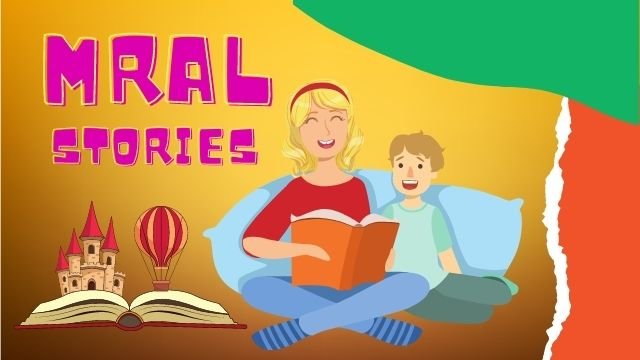
stories with a moral
When it comes to teaching kids a valuable moral lesson, most parents turn to short stories. It not only piques their interest, but it also teaches children valuable life lessons.
Short stories have a unique method of imparting knowledge that makes them more accessible and engaging. Rather than simply reminding your kid not to lie, offering them a brief tale about what happens when they do will help them grasp what happens when they do. It assists individuals in becoming more conscious of their behaviors and the implications of those actions. As youngsters get older, the moral lessons from these stories assist to build their character and moral compass.
Above are 20 short stories with moral teachings from which your kids (and even some adults) can learn:
1. The Ants and the Elephant
Once upon a time, there was a haughty elephant who used to bully smaller creatures. He’d go to an anthill near his house and spray the ants with water. Because of their size, the ants could only cry. The elephant simply chuckled and threatened the ants with death by crushing them. The ants had had it and decided to teach the elephant a lesson one day. They jumped into the elephant’s trunk and began biting him. The elephant could do nothing but howl in agony. He realized his error and apologized to the ants as well as all the other animals he had harassed.
The moral to this story:
Maintain a humble demeanor and treat everyone with respect. If you believe you are stronger than others, instead of injuring them, use your strength to protect them.
2. The Poor Slave and the Lion
Once upon a time, there was a slave who was mistreated by his master. He couldn’t stand it any longer and fled to the forest to seek refuge. He came upon a lion who was unable to move due to a thorn in its paw. Despite his fear, the slave summoned his bravery and extracted the thorn from the lion’s paw. When the lion was finally free of the thorn, he dashed into the jungle, oblivious to the slave’s presence. The slave was eventually apprehended in the jungle by his master, along with some animals. The slave was then thrown into the lion’s den by the master. The slave recognized the lion as the one he had aided in the wilderness. The slave was able to flee the den without being hurt, and he was able to free all of the other animals.
Your good deeds will always find a way to come back to you. So do good things and treat others with kindness, and the world will return the favor.
3. The Ugly Duckling
This is one of the most well-known fairy stories in the world, and most of us have heard of it. The plot centres around a duckling who has always felt different from his brothers since birth. He was constantly teased since he didn’t look like the other kids. He had had enough and rushed away from the pond where he had grown up. He traveled far and wide in search of a family who would embrace him. Months passed, seasons changed, but no one wanted him because he was such an unattractive duck. Then he came across a family of swans one day. When he looked at them, he realized he had transformed into a lovely swan during the months he had spent hunting for a family to call his own. He suddenly realized why he never looked like the rest of his siblings: he is a swan, not a duck.
We should not pass judgment on others just based on their outward appearance. Just because someone doesn’t suit societal beauty standards doesn’t mean they’re unattractive. Each of us is lovely in our way, and it’s past time we accepted and celebrated our differences.
4. The Boy Who Cried Wolf
Once upon a time, there was a shepherd boy who enjoyed playing tricks. While keeping an eye on the herd, the boy decided to play a joke and screamed out, “wolf! wolf!” People who had heard him hurried over to assist him. They were upset, however, when they discovered that there was no wolf and that the boy was mocking them. He did it again the next day, and many came to his rescue, only to be let down once more. The child observed a wolf devouring one of his lambs on the third day and cried out for rescue. However, many who heard him assumed it was simply another of the boy’s pranks, and no one came to his aid. The wolf took some of the boy’s livestock that day.
If you lie and cheat on other people all of the time, no one will believe you at some point.
5. The Grasshopper and the Ant
The grasshopper and the ant were best friends. During the summer, the ant works tirelessly to stock his food storage. The grasshopper, on the other hand, was taking advantage of the pleasant weather by playing all day. When winter arrived, the ant was snug in his home, surrounded by the food he had stored over the summer. While the grasshopper was hungry and cold in his home. He requested food from the ant, and the ant obliged. However, it was insufficient to see us through the winter. When he tried to ask the ant again, he was told, “I’m sorry, my friend, but my food is only enough for my family to live till the end of the winter.”
If I give you any more, we’ll all go hungry. We had the entire summer to prepare for the next winter, but you decided to play.”
In this story, winter depicts a period in our lives when food and resources are in short supply. Summer, on the other hand, is the season of abundance. So, if you have a lot today, set aside some for the winter.
6. The Grapes and the Fox
Once upon a time, a hungry fox came across a vineyard. The fox drooled as he saw the round, luscious grapes hanging in a group. But no matter how high he leaped, he was unable to reach it. So he rationalized that it was probably sour and walked away. He had to sleep on an empty stomach that night.
The majority of us have a proclivity to act like a fox. We makeup reasons when we want something but believe it will be too difficult to obtain. Instead of working hard for it, we persuade ourselves that it’s probably not that great.
7. Lazy John
John, a boy who was so sluggish that he didn’t bother to change his clothes, was one of them. He saw the apple tree in their yard was laden with fruit one day. He wanted to eat some apples but was too sluggish to climb the tree to get them. As a result, he sat down beneath the tree and waited for the fruits to fall. John waited and waited until he was ravenous, but no fruit dropped.
You can’t get anywhere by being lazy. If you desire something, you must put forth a lot of effort.
8. The Thirsty Crow
A thirsty crow wandered the woodland in quest of water after flying a long distance. Finally, he came across a half-filled water pot. He tried to drink from it, but his beak was too short to reach the interior water. He then saw pebbles on the ground and placed them in the pot one by one till the water level reached the brim. The crow quickly drank from it, satiating his thirst.
There is a way if there is a will. If we look hard enough and don’t give up, we can find a solution to any difficulty.
9. The Dog and the Bone
Once upon a time, there was a dog who roamed the streets at all hours of the day and night in quest of food. He came across a large juicy bone one day and instantly snatched it between his teeth and carried it home. He crossed a river on his way home and observed another dog with a bone in its mouth. He was also after that bone for himself. However, the bone he was biting fell into the river and sank as he opened his jaws. He went home famished that night.
If we continuously envy what others have, we, like the greedy dog, will lose what we already have.
10. The Tortoise and the Hare
Once upon a time, there was a hare who was friends with a tortoise. He challenged the tortoise to a race one day. The hare assumed that because the tortoise was moving so slowly, he would easily win. As a result, he took a nap as the tortoise continued on his way. When the hare awoke, the tortoise had already crossed the finish line. The tortoise, much to his dismay, won the race while he was napping.
This narrative can teach us a few moral lessons. Overconfidence, according to the hare, can lead to disaster. The tortoise, on the other hand, teaches us the value of tenacity. Never quit up, even if everything seems to be against you. It’s not always about who’s the quickest or strongest in life; it’s sometimes about who’s the most reliable.
SHORT MORAL STORIES FOR KIDS
Stories are an excellent technique to teach kids the difference between good and wrong. They also assist students in gaining a general awareness of human ethics and behavioral tendencies. We grew up reading and listening to Panchatantra stories, Tinkle, Amar Chitra Katha, and Jataka tales as youngsters, and we may not realize it, but those short moral stories for kids have played an important role in shaping who we are today.
These educational stories for kids instill values, ideas, and principles that form the bedrock of our characters. That is why it is critical to passing down these morally instructive short stories to help kids grow into well-rounded adults.
We’ve compiled a compilation of short moral stories for kids that are still relevant today. Plus, we’ve hand-picked a few modern stories from kidsstory.org that have symbolic, underlining meanings.
11. The Midas Touch
King Midas is the subject of this English kid’s fable. Midas, a tremendously wealthy king, lived in Ancient Greece. He had all he could have wished for and more, as well as a lovely daughter whom he cherished even more than his wealth.
Silenus, a satyr loyal to Dionysus, the God of Wine and Celebration, passed out in Midas’ garden one day. Midas went despite his family’s desires and let Silenus snooze in his palace until he awoke again, believing that satyrs brought him good luck.
When Dionysus learned of Midas’ generosity to his friend, he decided to grant the wealthy king a request. Midas wished that everything he came into contact with would turn to gold. Even though Dionysus was well aware that this was a formula for disaster, he still granted the desire. Midas was overjoyed, and he went around touching everything in the garden and palace to turn everything into gold. He transformed an apple into a gleaming gold apple when he picked it up. The courtiers were all enthralled.
Midas had never been happy in his life… He caressed his daughter, completely forgetting that anything he touched would turn to gold! As a result, his daughter became a dead gold statue. Midas hurried to Dionysus and asked God to save his daughter after realizing what he had done. Dionysus spared his daughter and took away all of Midas’ powers to fulfill his wish, claiming that it was for the best. Midas had learned his lesson and was content with what he had for the rest of his life.
Moral of the story : Don’t be greedy; be happy with what you have.
12. The Musical Donkey
Udhata, a skinny donkey who had been famished by his owner, a local fisherman, set off in quest of food with his jackal companion. In the middle of the night, the two went about the village until they came across a cucumber field. They enjoyed their supper so much that night that they resolved to visit the cucumber field every night. Udhata gradually improved her appearance and was able to carry greater weight.
The donkey insisted on singing after a delicious and nutritious dinner of cucumbers. Although the jackal warned him that this was a bad idea, the stubborn donkey refused to listen to his pal. Even when the jackal told the donkey that his voice wasn’t very lovely, Udhata rejected the jackal’s remark, supposing the jackal was jealous. He informed the jackal that he was pleased with himself, and there’s nothing wrong with that. The jackal admonished him once more about his foolish behavior and how he was causing trouble for himself by distracting the guards. The foolish donkey, on the other hand, would not budge.
The jackal halted the donkey’s singing and told him to wait till the jackal jumped over the other side of the fence for his protection. Outside, the jackal chose to wait. The guard naturally awoke from his nap when he heard the donkey’s loud braying noise. When the guard saw Udhata, he smacked him in the face hard. He didn’t hold back and directed all of his rages onto the donkey, who was sincerely remorseful for not following his friend’s advice. The donkey was scarcely able to move after he finished. Despite this, he managed to drag his limp body out of the field, where the jackal had been waiting. “I told you so,” his friend remarked with a compassionate expression on his face.
Moral of the story : Think before you act.
13. The Clever Monkey
Once upon a time, there was a wise monkey who lived on a tree that produced fresh, delectable fruit. A day came when a crocodile swam up to the tree and informed the monkey that he had traveled a great distance and was completely fatigued. The crocodile had been on the lookout for food and was ravenous. When the crocodile heard this, the friendly monkey brought him a couple of berries, which the crocodile gratefully accepted. He asked the monkey whether he may come back for some fruit soon. The monkey nodded enthusiastically.
The crocodile reappeared the next day, then the next, and so on. This became a daily practice for them, and they became excellent friends as a result. They talked about what was going on in their lives and confided in one other as all friends do. The crocodile informed the monkey about his wife, who resided on the opposite bank of the river. As a result, the crocodile was given some extra berries by the generous monkey to take home for his wife.
They ate berries together while the crocodile and the monkey grew closer as friends. The crocodiles would frequently receive additional berries from the monkey, which he would take home for his wife. The crocodile’s wife became envious of the two buddies because of their tight friendship. She was determined to end their friendship. She reasoned that if the monkey could survive on a diet of delectable fruit, his flesh must be exceptionally sweet. As a result, she requested that the crocodile invite his friend to supper. The crocodile declined because he suspected his wife was planning something nefarious. She was, nonetheless, adamant upon eating the monkey’s flesh.
She feigned to be sick and told the crocodile that her doctor said the only thing that could save her was a monkey’s heart. Hearing this, the crocodile dashed to the monkey’s branch and pretended to be his wife, telling him that she had cooked a delicious dinner for them. The monkey nodded enthusiastically and climbed onto the crocodile’s back. The monkey observed the crocodile sinking around halfway through. Fearful, the monkey inquired as to why his comrade was acting so strangely. The crocodile was straightforward in his explanation of the problem.
He was in an unpleasant situation, the wise monkey explained, because he had left his heart at home. He would gladly give his heart away to nurture the crocodile’s wife back to health if the crocodile took him back. The crocodile was fooled by the monkey’s brilliant deception and dashed back to the tree to steal the monkey’s heart. The monkey dashed up to safety as soon as they arrived, telling the crocodile to tell his wife that she had married an idiot!
Moral of the story : Stay calm and use your presence of mind to pull yourself out of a bad position.
14. The Lion Who Resurrected
This is the story of four intelligent and well-informed buddies. Subuddhi, the fourth, wasn’t very highly educated or insightful, but he did have one attribute that his scholarly peers lacked: common sense.
Three of the buddies decided to look for work in other cities and villages when the time came. They desired monetary compensation in exchange for their expertise. After all, it was pointless to be so knowledgeable about the scriptures and sciences if they weren’t going to benefit from it. The three friends did not want to bring Subuddhi because of his lack of intelligence, but they decided to invite him nonetheless because he was an old childhood friend.
The four companions embarked on a long journey, traveling from one town to the next in search of work. They came across a collection of bones under a tree while going through a deep jungle. They believed that this was an excellent opportunity to demonstrate their abilities.
The first friend put the bones together into a skeleton with his abilities. When the skeleton was finished, the second companion repeated a mantra, which caused flesh and meat to grow on it. It had the appearance of a dead lion. The fourth buddy intervened just as the third friend was ready to put an end to the performance by resurrecting the lion. Subuddhi knew the fearsome lion would not spare them once it was brought back to life.
The third friend, on the other hand, disregarded his counsel, mocked him, and pushed forward with something that was clearly a horrible idea. Subuddhi immediately climbed a nearby tree to protect himself as the third companion began to chant, resurrecting the lion. The lion killed all three of the knowledgeable friends, as predicted by the fourth friend, while Subuddhi rushed back to the hamlet alive.
That’s all there is to it, guys! We hope you enjoyed these motivational stories and that you will share them with your children. If you’re looking for additional short moral stories for kids, the kidsstory.org is a great place to start. We have books with interesting stories that are excellent for developing character and personality. In the comments, tell us about your favorite moral stories from childhood, and don’t forget to share them with your kids!
Moral of the story : Never give up.
Short Moral Stories That Teach Important Lessons
Morals and messages embedded in stories are always compelling. It’s incredible how effective a 200-word story can be.
Our first list of short stories was so popular that we decided to make another one, this time with each story having a simple moral.
Short Moral Stories
Some of these tales are brief and straightforward. Some are so simple that they’re almost certainly found in children’s books. The message’s power, however, remains unchanged.
Here are some more of the best moral stories in short form:
15. An Old Man Lived within the Village

In the village, there was an old man. He was one among the world’s most unfortunate individuals. The entire community was sick of him; he was always pessimistic, always complaining, and always in a foul attitude.
The longer he lived, the more bile he produced, and the worse his words became. People steered clear of him because his misery had spread. Being happy next to him was even unnatural and offensive.
Others were made unhappy by him.
But then, when he was eighty years old, something extraordinary happened. Almost immediately, everyone heard the rumor:
“An Old Man is cheerful today; he doesn’t complain about anything, grins, and even has a new look.”
The entire village had gathered. When the old guy was questioned, he was asked:
Villager: Can you tell me what happened to you?
“There’s nothing unique about it. I’ve been chasing happiness for eighty years, and it’s been fruitless. Then I decided to live without happiness and simply appreciate life. That is why I am now content.” – An Old Man
The moral of the story is to not seek happiness. Have fun with your life.
16. The Wise Man

People had been going to the wise man for years, talking about the same issues. He told them a joke one day, and they all burst out laughing.
He told them the same joke after a few minutes, and only a handful of them grinned.
No one laughed when he delivered the same joke for the third time.
With a smile, the wise man said:
“You can’t laugh at the same joke over and over.” So, what makes you cry over and over again about the same thing?
The moral of the story:
Worrying is a waste of time and energy that will not fix your difficulties.
17. The Foolish Donkey

Every day, a salt salesman would ride his donkey to the market with his salt sack.
Along the way, they had to cross a brook. The salt bag and the donkey both went into the water as the donkey tumbled down the creek one day. Because the salt dissolved in the water, the bag became extremely light to carry. The donkey was overjoyed.
The donkey then began to repeat the same trick every day.
When the salt vendor realized the ploy, he resolved to give it a lesson. The next day, he loaded a cotton sack onto the donkey.
It tried the same method once more in the hopes of making the cotton bag lighter.
However, the wet cotton became extremely heavy to carry, and the donkey suffered as a result. It had learned a valuable lesson. After that day, it no longer worked, and the vendor was pleased.
The moral of the story is that luck does not always favor you.
18. Having A Best Friend

Two buddies were walking through the desert, according to legend. During the journey, they got into a disagreement, and one of them slapped the other in the face.
The person who was smacked was upset, but instead of saying anything, he scribbled in the sand.
“My best friend hit me across the face today.”
They continued going till they came to an oasis and decided to take a bath. The person who had been slapped became caught in the muck and began drowning, but was rescued by a friend. He wrote on a stone once he recovered from his near-drowning.
“My best friend saved my life today.”
He was asked by the friend who had slapped and saved his closest friend:
“You wrote in the sand when I harmed you, and now you write on a stone, why?”
The other person responded,
“When someone wrongs us, we should scribble it in sand and let the winds of forgiveness sweep it away. When someone does anything nice for us, however, we must inscribe it in stone so that no wind can ever wipe it away.”
The moral of the story :
Don’t appreciate what you have in your life. However, appreciate those you have in your life.
19. The Fox & The Grapes

A fox was wandering through the woods one day when he noticed a bunch of grapes hanging from a high limb.
“Just the thing to quench my thirst,” he thought to himself.
The fox took a few paces back and leaped, just missing the dangling grapes. The fox stepped back a few yards and attempted to reach them again, but was unsuccessful.
Finally, the fox gave trying and turned up his nose, saying, “They’re probably sour anyway,” before walking away.
It’s all too simple to resent something you can’t have.
20. The Poor Slave and the Lion

A slave flees to the wilderness after being mistreated by his owner. He stumbles upon a lion who is in excruciating pain due to a thorn in his paw. The slave bravely advances and delicately removes the thorn.
Without injuring him, the lion flees.
A few days later, the slave’s master goes hunting in the forest and captures a large number of animals, which he then cages. The master’s men spot the slave and capture him, bringing him to the nasty owner.
The slave is ordered to be thrown into the lion’s cage by the master.
The slave is in the cage awaiting his death when he realizes it is the same lion he had aided. The lion and the other captive animals were rescued by the slave.
Helping those in need is a good thing to do since we reap the benefits of our good deeds.
Parents are constantly on the search for good moral stories for their children. However, at KathaKids, we think that even if the morals of stories aren’t explicitly stated, children learn them. The takeaway, or moral of the story, is apparent when a story is well-written. Lessons like these are assimilated far more readily than those that are spelled out.
We also don’t believe that children should be spoon-fed morals. Rather, we believe that stories stimulate children’s imaginations. This may prompt discussions with their parents and peers about the story and what they learned from it. (When we encouraged kids to come up with their morals for the stories they read, they were extremely enthralled!) And this is a genuine learning process.
Having said that, we recognize that parents may require assistance in finding moral stories for their children, possibly to tie to an incident that has occurred in their daily lives.
If you’re seeking moral stories for children, Kidsstory.org has a selection of them.
The Princess And The Pea Story
Choose best story for kids with moral lessons, related articles.
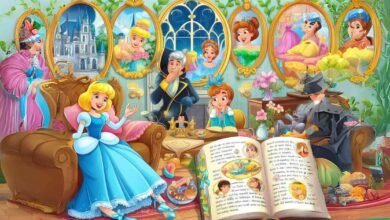
Cinderella | Going To Bed Stories For Children

A Caterpillar’s Voice

A Donkey to Market

The Story of the Empty Pot: Jun’s Epic Journey
- Pingback: 10 Best Short Moral Stories for Kids + Moral Lesson
- Pingback: Short Story The Last Forest – Engaging Kids’ Tale
- Pingback: Short Kids Story Donkeys | Engaging Tales for Children
Leave a Reply Cancel reply
Your email address will not be published. Required fields are marked *
Privacy Overview

7 Best Short Moral Stories
Short Moral Stories are a great source of entertainment along with their learning aspect. Some of the best stories that have been portrayed in movies or books always have a learning or moral element. It becomes extremely crucial to narrate and make your kids familiar with stories with great morals . Stories can help in developing in kids while embedding essential values in them that they will require in the future to be great individuals and an important asset for society. Therefore, Podium brings you some of the best English short moral stories for kids to learn.
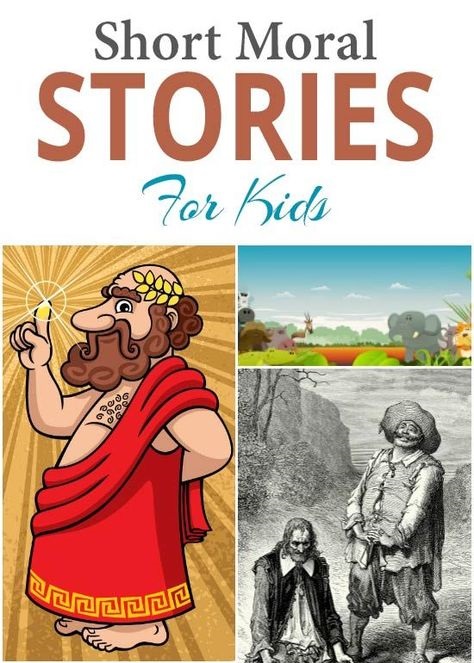
Clever Fish
Time is valuable, the gift of honesty, two lazy brothers, too many bananas, no smiles today, the magical cow, frequently asked questions.
A fisherman was heading to the river to catch some fish. He threw his net into the river and he just sat waiting there for fish to come into the net. He was fishing so that he could sell a lot of fish in the market and get some good money out of it. After some time , the fisherman heard some hustle and bustle in the net. The fisherman thought he must have got a lot of fish in the net, he actually took the net out of water . The fisherman was very disappointed because he only got a tiny little fish in the net, he was annoyed. He grabbed hold of that fish but then suddenly, the fish started talking to him.

Tiny little fish begged the fisherman to leave and let her go. But the fisherman did not pay any attention to the request of the fish. The fish kept on requesting the fisherman, “I can help you a lot if you think fisherman. If you leave me back in the water, I will tell all my friends about you and I will bring them near to the bank of the river. So that, when you come next time, you will have much more fish.” The fisherman thought to himself, “Wow, this is not a bad deal at all.” He was thinking if he let go of one tiny little fish today, tomorrow he will get a lot more fish because this tiny little fish will bring all her friends to me.

The Moral of the Story
The tiny little fish was able to convince the fisherman and he allowed the fish to go back into the river. The tiny little fish was really happy and swam away happily into the river never to come back. Poor fisherman, he came the next day expecting that there will be a lot of fish that this tiny little fish would bring. But that tiny little fish was very clever and because of her cleverness, she saved her life from the fisherman. So children, the moral of this story is you have to be really clever to save your life from such challenging moments.
Arjun was a very lazy boy. He always used to postpone things. He had a bad habit of procrastination. Arjun’s father was fed up with him, and that is why he emphasized the importance of time and time management to Arjun. He said that you should never waste time. Arjun promised his father that he would never postpone things from now on. One of Arjun’s teachers called him and told him that he had won the singing competition that was held a month ago, although, he needs to collect the winning prize the next day itself. Although as usual, Arjun didn’t care and went to take the prize the next day. To Arjun’s surprise, the prize was a ticket to the circus that was done yesterday, making the prize worthless. Thus, Arjun learnt a lesson from this incident.

The moral of the story is that time is very valuable. You should always do things on time and never procrastinate.
A long time ago in a village lived a painter named Jack. Jack was known for his honesty and nice behaviour. Although, Jack was a poor guy and he was a painter. His earnings were very less. His life was full of struggles and an entire day of hard work could only provide him two meals a day. He was wished for a bigger project so that he could earn a lot more. Jack was fully committed to small tasks as well.
One day the landlord of the village called Jack and said, “Listen to me Jack, I have called you for a very important job. Do you want to do it?” Jack replied, “Sure sir, I will definitely do it. Tell me what work is it?” The landlord then expressed his requirements and wanted Jack to paint his boat near the river bank. He wanted the work to be finished by today itself. Jack replied, “Okay sir, I will finish the work by today only.” Jack was very happy about getting work. Later the landlord asked Jack about his charges for the work, to which Jack replied, “I generally charge 1500 bucks for this job, rest you have to decide.” The landlord agreed to Jack’s charges of 1500 bucks and asked that the work should be good. Jack reassured the landlord and asked him not to worry.

The landlord then took Jack near the river to see his boat. After seeing the boat, Jack asked for some time from the landlord as he went away to bring his materials and stuff. As soon as Jack returned with his material, he started painting the boat. As Jack was painting the boat, he noticed a big hole in the boat.
Jack thought if he paints the boat without fixing the hole, the boat will sink and decided to first block the hole and then continue with his painting. Jack then blocked the hole and painted the whole boat later. He then went to the landlord and informed him that the work is finished. The landlord agreed and asked Jack to accompany him to the boat. They reached the shore and the landlord said to Jack as he saw the boat, “Wow Jack! You have done commendable work. Do me a favour, visit me tomorrow morning and collect your wages.” Both of them then headed straight to their homes.
The family of the landlord went sightseeing a day after in the same boat. Later in the evening, the servant of the landlord, Charlie, returned from vacation and enquired about everyone as he couldn’t spot anyone in the house. The landlord told him everything. On listening to the landlord, Charlie got stressed. The landlord asked Charlie after seeing him stressed, “What happened Charlie? Why do you look so tensed?” Charlie told him about the hole in the boat. The landlord freaked out after hearing this.
Within a few minutes, the family of the landlord returned back home after a day-long journey. The landlord took a sigh of relief after seeing his wife and kids completely fine. The next day, the landlord called Jack and said to him, “Here Jack, take your pay. You have done a great job. I am very happy with your work quality.” After counting the money, Jack got massively surprised. The amount was more than what he was hired for. Jack said to the landlord, “Sir, you have given me more amount by mistake.” “No Jack, I haven’t paid you any extra amount. Take it, you deserve this money, it is all yours” the landlord added. Jack questioned again, “But sir we agreed for only 1500 bucks. These are 6000 bucks. How come it is the right time.”
The landlord later explained to Jack that the increase in money is because Jack has done great work. Jack got confused. The landlord then continued, “You blocked the hole in the boat about which I was totally unaware of. If you wanted, you could have left the hole as it was or could have asked for more money but you didn’t either of them. Because of you blocking the hole, my family was able to travel safely in the boat. Had not you blocked the hole, my family could have drowned. Because of you only they are safe. This is why this money is for you, your hard work, and your honesty.”
Jack got very happy for the money and for the landlord’s kindness. Jack then thanked the landlord and happily went back to his home.

Honesty and hard work always pay off in the end.
In a state lived two brothers named Tim and George. They were slackers since childhood. The reason behind them lingering here and there was their lazy attitude. Whenever they were told to work, they used to sleep due to their lazy attitude. Tim and George’s mother was fed up with them. She couldn’t figure out what she must do to make her kids work hard. One day Tim and George were resting under a mango tree . After some time, a mango fell in between them. Since both of them were feeling extremely lazy, none of them made efforts to pick the mango. They just kept on staring at the mango.

As they were resting, the minister of the state was passing by the same route. On seeing the minister, Tim said to the minister, “Good afternoon Minister. We need a favour from you.” The minister replied, “Are you two being serious?” Tim continued, “If possible, can you please pass me this mango?” The minister found Tim very weird. He said, “the mango is lying in front of you. You can pick it yourself.” Tim replied, “It is not possible for me sir. I will have to work very hard to grab it.” “What sort of hard work is this?” The Minister replied and added, “You can’t lean your body two inches further?” to which Geroge replied, “Yes sir, this is the only problem. Who likes to work? Please give us the mango.”
The minister got angry as he disliked their laidback attitude and went away. Tim and George remained intact in their positions. The minister then went to Tim and George’s place and met their mother. Their mother claimed she doesn’t know how to change them. The minister asked their mother to send them to his palace.
Both Tim and George went to the palace the other day and met the king. The king said to Tim and George, “I have some special work for you two. From tomorrow onwards, you two will guard one end of the palace. Since you both don’t like to do so much work, you will be able to do this task.” The minister asked both of them to be careful as there is a lot of precious material in the area that Tim and George will be guarding and we don’t want any sort of mishappening.
Tim and George then begin to guard the palace. But after some time, they sat down and slept. Due to their carelessness, that end of the palace got robbed. The next morning when they woke up, they found the minister standing in front of them. The minister yells at them and expressed his disappointment. The minister emphasized, “Because of your laziness, the minister has suffered heavy losses last night. You two are punishable for a death penalty now.” As soon as they heard the minister, both Tim and George freaked out. As soon as they are presented in front of the lion , they bow down to the king and cry for their lives. After hearing their plea, the king forgave Tim and George.
From this story, we learned the lesson that we must never be lazy.
Shringeri Shrinivas was having a very bad day. He asked so many people to take the bananas that he had grown on his farm. “No, thank you,” they all said. “The quality of the bananas are too good, we like them but we have had too many. We cannot eat anymore.” Poor Shringeri Shrinivas! He then got the idea to take assistance from the Farmer’s Centre in Doddooru, a big town near his village. Off he went, carrying the best crop of bananas.

A few days later, Shringeri Shrinivas returned home looking very happy. He started growing bananas on his farm amusingly now. Although this time around, Shringeri did not offer fruits to anybody surprisingly. Not to his family, not to his neighbour, not to his friends, not to the traders, and not even to his cows! Everyone became very curious. Where were all the bananas going? Then one-day Shivanna, Shringeri’s neighbour organized a big pooja to please the Gods. The priest of the pooja requested Shivanna to gather 108 ripe bananas as they will be essential to the pooja. Shivanna ran to Shringeri Shrinivas. “I am sorry for saying no to you before but now I need 108 ripe bananas. Can you help me, please?’ Shringeri Shrinivas tapped his chin. “Well, let me see what I can do”
The pooja started. The whole village came to watch. The priest began chanting. Then the priest asked for the bananas to offer them to the gods. Just then, in came Shringeri Shrinivas carrying a big bag. From the bag, he carefully took out 27 packets. On each packet was written- “High-Quality Banana Halwa, S.S. Farms.” Shringeri Shrinivas offered one to the priest. “Each packet contains the pulp of four bananas. There are 27 packets. So here are your 108 ripe bananas!” This later cracked up the entire village and everyone started laughing at Shringeri Shrinivas. This made it clear what Shringeri has been doing with all those bananas now.

Never act too smart and become overconfident.
Shanti and Arun were good friends. Shanti was always cheerful. One day, Shanti walked into the classroom slowly. Her head was bent down. She looked sad. “Did someone scold you?” asked Arun. Shanti shook her head. She sat down and did not lookup. She did not answer ‘Present!’ when Miss Sona called her name. Miss Sona called again, louder this time, “Shanti Kumari!” Shanti raised her hand. “Do you have a sore throat?” her teacher asked. Shanti shook her head. “Are you feeling okay?” Miss Sona asked. Shanti stayed quiet.

Arun wanted to make her smile. He had an idea! He took something out from his bag. When he ran to show it to Shanti, he slipped and the item went flying towards Shanti. Shanti saw it and caught it. It was a big green rubber frog! Shanti’s eyes flew open. She opened her mouth to laugh. That is when Arun and her friends saw why she had not smiled or talked all day! Four of her front teeth were missing!
Always surround yourself with good company and friends and be there for one another in whatever way possible.
A long time ago in a small village lived two farmers named Lewis and Harry. Lewis and Harry were very rich farmers. They had a huge farm and many cows but they were not happy, they wanted more. In their neighbourhood lived another farmer named George. George was a poor farmer. He had only one cow and a small farm. But he was happy with what he had. Every night before sleeping, he used to thank god for what he had. Everything was running smoothly until one day Lewis and Harry came to George’s house to purchase his cow. But George didn’t want to sell his beloved cow, so he clearly said, “I don’t want to sell my cow, please leave my house.” Hearing George’s response, Lewis and Harry got angry. They decided to take revenge and they made a plan.

They burned George’s crop at night. George saw his farm in the morning and he was heartbroken. Even after a week, he could not think of any solution. Also, the poor cow starved as he could not feed her. So he thought it is better to sell the cow as he couldn’t feed her. The next morning, along with the cow, he took whatever little silver coins he had and left for the market. On the way to market, George thought of what if some robbers attack me on the way. Because of that, he hid his silver coins in the pocket of the cow’s jacket. After travelling for a while, he got tired and decided to rest in an inn. He tied the cow outside the inn and went inside.
Just then suddenly, a silver coin rolled out of the cow’s jacket. The owner of the inn saw this and he got amazed thinking this must be a magical cow. The owner got greedy. He approached George and asked him to sell the cow to him for a pouch of silver coins. George knew this is not the actual price but thinking this was God’s wish, George agreed to sell the cow to the inn’s owner. George took the pouch of silver coins and left happily back to his village. On reaching his house, he sat on his bed and begin to count the coins.
Just then Lewis and Harry came to his house to mock him but they found that George is surrounded by many silver coins. They were surprised. They could not believe their eyes. George told them everything and after hearing his story, Lewis and Harry couldn’t believe their plan had failed. They planned so much to take revenge but they ended up with nothing.
From this story, we learned that nothing can be gained by doing harm to another person.
In this article, we learned multiple stories and the morals that they had in them. It is important for kids to read such stories and incorporate the good values shown and portrayed in the stories as it is a major part of their development. However, we should also focus on the evil characters in the stories and learn what to not do in the future and become good human beings.
You can also check out how to write a short story yourself here!
Question 01: Are moral stories a necessity for a kid’s development?
Answer: Yes. they are, as moral stories teach kids the difference between what is right and what is wrong.
Question 02: Name some short story authors that one should know.
Share with your friends
Related Posts:

Leave a Reply Cancel reply
Your email address will not be published. Required fields are marked *
Save my name, email, and website in this browser for the next time I comment.
Need To Teach Your Little One A Life Lesson? Try Short Moral Stories For Kids

Got any good moral stories? You know what people love to say to parents: “You only have 18 years. That’s it.” Of course, that’s usually followed by the person saying, “Cherish it.” And it’s generally done as a judgmental response because you dared complain. But let’s put the rest of it aside — you really do only have 18 years with your kids. In that time, you have to turn them from a blob to a fully functioning, kind adult . School lessons and homework help will teach them the basics. Assigning chores will teach them life skills. How do you teach morals, though? How do you make sure your kids are good or ethical creatures? A mere 18 years isn’t long at all. And even if it doesn’t stick, we still want to instill a basic level of goodness in our kids. Moral stories are a great way to do just that.
The hitch? You know, kids have short attention spans, and sometimes those stories are hella long. What we need, at least in the beginning, are “elevator pitches.” Those 10-line stories with morals that you can share with your kids . Something you can drop on them at a moment’s notice: between soccer periods, in the middle of Target, or directly after their first big fib and before they forget all about it.
Believe it or not, there are actually a ton of solid, ages-old moral stories or fables that you can share (and share quickly). Here are a few of our favorite short moral stories, all in 10 lines or less.
Classic Short Moral Stories for Kids
1. “the boy who cried wolf”.
Lesson: No one believes liars.
Once there was a shepherd boy who spent long hours in the field, tending to his sheep. It could get pretty boring out in the field. To pass the time one day, he cried, “Help! Help! A wolf is trying to eat my sheep!” Villagers and friends came running to his rescue, and the boy fell over laughing. “Just kidding! But, since you’re here, do you want to play?” The villagers were annoyed that he interrupted their work in town and left. The next day, the boy got bored and tried again. “Help! Help! There’s a wolf!” Everyone came running to help, and, once again, the boy laughed and admitted that no wolf had come. A few days later, the boy was dozing under a tree when a twig snapped nearby. He opened his eyes to find himself face to face with a wolf! “Help! Help! Wolf!” This time, though, the villagers didn’t come. They wouldn’t be fooled a third time. The wolf ate one of the sheep and left. That evening, as the boy herded his sheep through town, he scolded his neighbors for not coming to his rescue. “Why would we?” asked a friend. “You’d already lied to us twice before, and we had more important work to do than play your games.” The boy promised never to cry “wolf” again unless there really was a wolf.
2. “The Lion and the Mouse”
Lesson: Being kind pays off.
One day while a mighty lion was napping, a tiny mouse ran up and down his body. This woke the lion, who, angry about the mouse ruining his nap, caught the mouse. Just as he was about to eat him, though, the mouse squeaked. “Please don’t eat me!” it said. “I promise that if you spare me now, someday I’ll help you.” The lion wasn’t sure how a tiny mouse could possibly help him, but he let him go. Days later, some hunters came and trapped the lion, tying him to a tree while they went to do more hunting. Just then, the mouse was scurrying by and saw the lion all tied up. Remembering his promise and that he owed the lion a favor, he stopped what he was doing and chewed through the ropes, freeing the lion.
3. “The Golden Touch”
Lesson: Being greedy can actually hurt you.
One day a great and powerful king spotted a magical creature snarled in the brush. The creature asked for help. “I’m a rich and powerful king. I don’t have time to help you,” he said, starting to leave. Then he remembered that the creature could grant wishes. “I’ll help you. But only if you give me a wish.” The creature agreed, and the king cut him free. “I wish to turn everything I touch to gold,” the greedy king said. And so, his wish was granted. He was so happy. He knew that with that power, soon enough, he could turn everything gold. He’d be the richest king ever! When he got home, his daughter was thrilled to see him and came running to hug him. In the king’s excitement, he scooped up his princess, ready to tell her how they were about to be even richer — except his touch turned her to solid gold, too. The king spent the rest of his life looking for a way to wish his daughter back to life, willing to give up all his gold to be able to hug his princess again.
4. “The Tortoise and the Hare”
Lesson: Slow and steady wins the race.
A tortoise and a hare lived in the same meadow. Every day, the hare laughed as the tortoise trudged slowly about his daily duties. Meanwhile, the hare raced through his chores and had plenty of time to play. One day, the tortoise challenged the hare to a race. “You want to race me? You’re so slow. You’ll lose!” Still, they raced. At the start of the race, the hare left the tortoise in his dust and, just to add insult to injury, decided to stop and take a nap at the halfway point. “I’ll let the tortoise pass me napping, and then I’ll run after him and beat him,” the hare said. Except he didn’t. The tortoise moved slowly, steadily, and quietly past the napping hare, who didn’t wake up when he passed him. The tortoise crossed the race’s finish line and was quietly celebrating when the hare awoke from his nap and came racing through, but he was too late. He lost.
5. “ The Ants and the Grasshopper”
Lesson: Always be prepared.
A grasshopper and an ant bump into each other on a dirt path. As the ant rushes past a grasshopper, the green jumper asks the ant why he’s working so hard. The ant tells him it’s because he’s storing food for the winter. The grasshopper laughs and replies that it’s summer and that he should worry about winter when it comes. When winter does arrive, the grasshopper starves while the ant is prepared.
6. “The Crow and the Pitcher”
Lesson: Think outside the box.
A crow was flying around the forest, and was very thirsty. After searching for hours, he still could find nothing to drink. Suddenly he saw a pitcher filled with water, but it had a very narrow neck. And so the crow still could not reach the water. Then, he noticed pebbles around the pitcher, and picked them up one by one and dropped them into the pitcher. When the water rose to the tip of the pitcher, and the crow could finally quench its thirst.
7. “The Wind and the Sun”
Lesson: Sometimes gentle persuasion is mightier than force.
The wind and the sun were arguing about who was the strongest and decided to settle it by making a bet. A man walked down the road with a coat on, and whoever could remove the coat from the man’s back would prove their strength and win. The wind went first and blew his strongest winds at the man, but he held on to his hat and coat tightly. Exhausted, the wind gave up. Then the sun tried and simply shined his rays down on the man. He didn’t increase his heat or exert any effort. Overwhelmed by the warm weather, the man removed his coat.
How do you find the moral of the story?
The “moral” of the story is the takeaway or what you get out of it. Or, in this particular case, the lesson you can learn. The easiest solution is to look at the characters, find what they’ve done repeatedly, and how and why they change their behavior at the end. This video from textbook makers Mcgraw Hill (where the dad sounds oddly like Nick Offerman) does a great job of explaining how to find the moral.
How do you write a moral story for kids?
Writing any story requires a certain level of imagination and creativity. Add in a specific moral that you’re trying to teach along with a length requirement, and things get overwhelming. To write a moral story, you should start with deciding what the moral should be. Consider real-life scenarios of how you’ve seen that moral in practice. From there, take your real-life story and find a way to make it more relatable to kids. You can do this by making the main character younger or including funny-named animals. Lean into things they enjoy doing or playing. Most importantly, you’ll want to keep your story short and sweet.
So You Want To Write has great tips for writing a short story, including:
- Start as close to the end as possible.
- Keep the number of characters small.
- Give the reader someone to root for.
- Suggest a backstory, but don’t elaborate.
- Keep up the pace.
This article was originally published on Oct. 24, 2021
10 Lines Short Stories With Moral Lessons for Kids
Moral Lessons , Most Popular

Published December 1, 2023
When trying to impart an important moral lesson to kids, short stories are often the go-to for most parents. It not only tickles their imagination, but it also teaches them about life.
Short stories have a way of teaching lessons that makes them more relatable and exciting. Rather than telling your kid not to lie, relating a short story helps them understand what happens when they lie. It helps them become more aware of their actions and their consequences. The moral lessons from these stories also help shape their character and moral compass as they grow old.
Here are 10 short stories with moral lessons that your kids (and even some adults) will learn a thing or two from:
1. The Hare and the Tortoise

There was once a hare who was friends with a tortoise. One day, he challenged the tortoise to a race. Seeing how slow the tortoise was going, the hare thought he’d win this easily. So, he took a nap while the tortoise kept on going. When the hare woke, he saw that the tortoise was already at the finish line. Much to his chagrin, the tortoise won the race while he was busy sleeping.
Moral of the story:
There are a couple of moral lessons we can learn from this story. The hare teaches that overconfidence can sometimes ruin you. While the tortoise teaches us about the power of perseverance. Even if all the odds are stacked against you, never give up. Sometimes, life is not about who’s the fastest or the strongest; it’s about who is the most consistent.
2. The Dog and the Bone

Once, there was a dog who wandered the streets night and day in search of food. One day, he found a big juicy bone, and he immediately grabbed it in his mouth and took it home. On his way home, he crossed a river and saw another dog with a bone in its mouth. He wanted that bone for himself, too. But as he opened his mouth, the bone he was biting fell into the river and sank. That night, he went home hungry.
If we always envy others, we’ll lose what we already have, just like the greedy dog.
3. The Thirsty Crow

After flying a long distance, a thirsty crow wandered the forest searching for water. Finally, he saw a pot half-filled with water. He tried to drink from it, but his beak wasn’t long enough to reach the water inside. He then saw pebbles on the ground, and one by one, he put them in the pot until the water rose to the brim. The crow then hastily drank from it and quenched his thirst.
If there’s a will, there’s a way. Every problem has a solution if we look hard and don’t give up.
4. Lazy John

There was a boy named John who was so lazy he couldn’t even change his clothes. One day, he saw the apple tree in their yard was full of fruits. He wanted to eat some apples, but he was too lazy to climb the tree and take the fruits. So he lay down underneath the tree and waited for the fruits to fall off. John waited until he was starving, but the apples never fell.
Laziness can get you nowhere. If you want something, you need to work hard for it.
5. The Fox and The Grapes

Once, there was a hungry fox who stumbled upon a vineyard. After seeing the round, juicy grapes hanging in a bunch, the fox drooled. But no matter how high he jumped, he couldn’t reach for it. So he told himself that it was probably sour and left. That night, he had to sleep on an empty stomach.
Moral of the Story:
Most of us tend to act like the fox. When we want something but think it’s too hard to attain, we make excuses. We tell ourselves that it’s probably not that great instead of working hard for it.
6. The Ant and The Grasshopper

The ant and the grasshopper were good friends. In the summer, the ant works hard to fill his storage with food. While the grasshopper was enjoying the fine weather and playing all day.
When winter came, the ant was lying cozily in his home, surrounded by the food he stored during the summer. While the grasshopper was in his home, hungry and freezing. He asked the ant for food, and the ant gave him some. But it wasn’t enough to last the entire winter. When he tried to ask the ant again, the latter replied: “I’m sorry my friend but my food is just enough for my family to last until the end of winter. If I give you more, we too will starve. We had the entire summer to prepare for the winter but you chose to play instead.”
Winter, in this story, represents a time in our lives when food and resources are scarce. Summer is that time when everything is abundant. So, if you have a lot right now, save some of it for the winter.
7. The Boy Who Cried Wolf
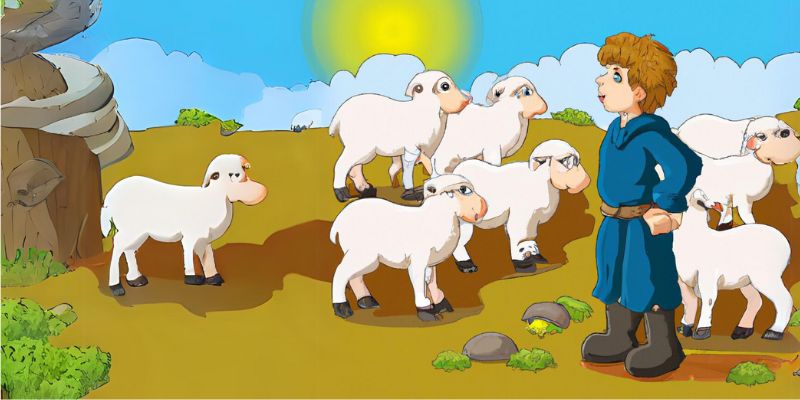
There was once a shepherd boy who liked to play tricks. One day, while he was watching over the herd, the boy decided to play a trick and cried, “wolf! wolf!”. The people who heard rushed over to help him. But they were disappointed when they saw no wolf, and the boy laughed at them. The next day, he did it again, and people rushed to his aid, only to be disappointed again.
On the third day, the boy saw a wolf devouring one of his sheep and cried for help. But the people who heard him thought this was just another of the boy’s pranks, so no one came to help him. That day, the boy lost some of his sheep to the wolf.
If you always lie and cheat on other people, there will come a time when no one will believe you anymore.
8. The Ugly Duckling

Most of us have probably heard of this story as it is one of the most famous fairy tales in the world. The story revolves around a duckling who, from the moment of his birth, has always felt different from his siblings. He was always picked on because he didn’t look like the rest of them.
One day, he had enough and ran away from the pond he grew up in. He wandered nearby, looking for a family who would accept him. Months passed, and seasons changed, but everywhere he went, nobody wanted him because he was such an ugly duck. Then, one day, he came upon a family of swans. Upon looking at them, he realized that during the months he spent looking for a family to call his own, he had grown into a beautiful swan. Now he finally understood why he never looked like the rest of his siblings because he wasn’t a duck but a swan.
We shouldn’t be too quick to judge others based on their physical appearance. Just because someone doesn’t fit societal definitions of beauty doesn’t mean they’re ugly. Each of us is beautiful in our unique way, and it’s time we accept and celebrate that individuality.
9. The Lion and the Poor Slave
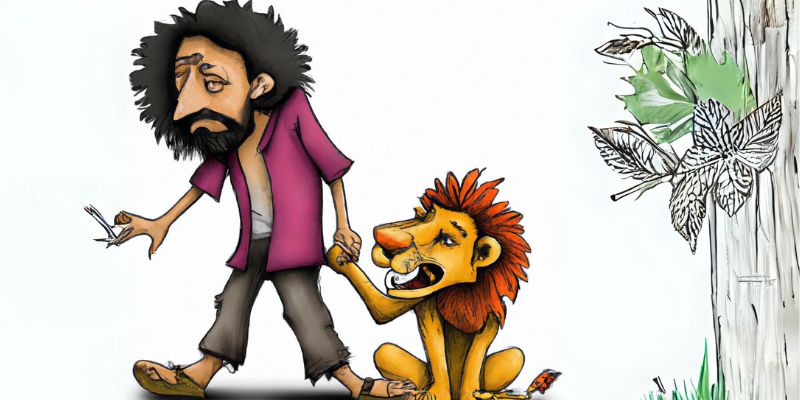
There was once a slave who was treated cruelly by his master. One day, he couldn’t take it anymore and ran to the forest to escape. There, he chanced upon a lion who couldn’t walk because of the thorn in its paw. Although scared, the slave mustered his courage and took out the thorn in the lion’s paw. When the lion was finally free of the thorn, he ran into the forest and didn’t harm the slave.
Sometime later, the slave was caught by his master along with some animals in the forest. The master then ordered the slave to be thrown into the lion’s den. When the slave saw the lion, he recognized it as the lion he helped in the forest. The slave was able to escape the den unharmed, and he freed all the other animals.
The good you did will always have a way of returning to you. So do good deeds and be kind to others, and the world will be kind to you.
10. The Elephant and the Ants
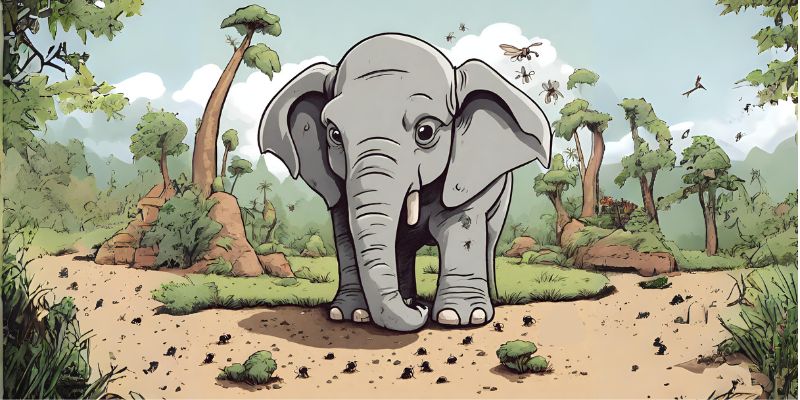
There was once a proud elephant who constantly bullied smaller animals. He would go to the anthill near his home and spray water at the ants. The ants, with their size, could do nothing but cry. The elephant just laughed and threatened the ants that he would crush them to death. One day, the ants had enough and decided to teach the elephant a lesson. They went straight into the elephant’s trunk and started biting him. The elephant could only howl in pain. He realized his mistake and apologized to the ants and all the animals he bullied.
Be humble and treat everyone with kindness. If you think you’re stronger than others, use your strength to protect them instead of harming them.
Donate To The Poor & Homeless Of South Florida
Our Father’s House Soup Kitchen has fed the poor and homeless in South Florida over 900,000 hot meals since 1993. Our tax deductible non profit organization also accepts and distributes donations such as clothing, toiletries, shoes, bicycles, and more. You can donate to help the poor and homeless through our website.

Reviewed For Factual Accuracy
Our team meticulously fact-checks all website content before publishing. Discover more about our website’s editorial standard here and the dedication we uphold.

About The Author
Judy Ponio is a professional writer and devoted Christian. She has a passion for writing about topics related to morality and helping the poor and homeless. She is the lead author for the Our Father’s House Soup Kitchen blog.
Correct Digital, Inc is paid by private donors to provide website digital marketing services to this non-profit organization.
Related Posts

Most Popular , Soup Kitchen
What are Youth Emergency Shelters?

Moral Lessons
7 Times Jesus Taught Us About Kindness

How to Show Empathy in 15 Simple Ways

501(c)(3) not for profit based in Pompano Beach, Florida USA
Helpful Links
Blog ✦ About ✦ Gallery ✦ Contact

© OFHSoupKitchen.org 2024
View Our Privacy Policy
Web Development by Correct Digital
Donate To Help The Poor & Homeless Of South Florida
Our Father’s House Soup Kitchen has served over 900,000 hot meals to those in need since 1989. Help us continue our mission to serve God’s precious poor with an online tax-deductible donation.


IMAGES
VIDEO
COMMENTS
First off, know what you're going to write about. The moral of a story usually revolves around the story's theme. The theme is the element of the story which carries the central idea, motif, or belief in a story. It permeates the entire story and persists throughout the narrative. So, figure out what your theme is and you'll more easily ...
A selection of moral short stories that teach values or life lessons. The stories are suitable for children and older readers. ... Many of the following stories are also good for children, but the writing level and content make them suitable for adults. 1. "The Good Samaritan" at Luke 10:29-37. An expert on the law asks Jesus, "Who is my ...
Fictional stories that deal with moral issues help us to explore our own values and beliefs, and they challenge us to think about the world in a new way. By engaging with these stories, we become more empathetic, more compassionate, and more aware of the complex nature of morality. ... Writing a short story that has a valuable lesson Relatable ...
2. "The Cactus" by O. Henry. One of my favorite things about this short story by O. Henry is its clever twist ending! Many short stories with moral lessons have similar twist endings, which could be why they make such great additions to thematic units!. O. Henry's "The Cactus" tells the story of a budding romance. A young man tries to charm a young woman, but his boastful nature ...
The Core Emotions of a Morality story are satisfaction, pity, and contempt. Audiences choose Morality stories to experience righteous satisfaction at the proper outcome for the protagonist, whether negative or positive. They want to feel pity for the tested and contempt for the unrepentant but righteous satisfaction when the punishment comes.
Know what a short story is versus a novel. 2. Pick a simple, central premise. 3. Build a small but distinct cast of characters. 4. Begin writing close to the end. 5. Shut out your internal editor.
The Inciting Incident: The protagonist is presented with a moral dilemma or conflict that challenges their existing beliefs and values. The Turning Point: The protagonist makes a morally significant decision that sets the course for the rest of the story. The Dark Night of the Soul: The protagonist faces the most significant ethical challenge ...
Moral of the Story: Example 5: Hints - A Wise Tortoise, A Hasty Hare, A Race, Patience. Example 6- Hints: A selfish fox, a generous rabbit, a barren garden, the joy of sharing. Moral of the Story: Example 7- Hints: A timid deer, a roaring waterfall, facing fears, unexpected bravery. Moral of the Story:
In your story, start writing scenes around conflict, and make sure each paragraph and piece of dialogue relates, in some way, to your protagonist's unmet desires. 4. Write Your First Draft. The scenes you build around conflict will eventually be stitched into a complete story.
Step 1: Determine the Moral of the Story. Decide on a maxim that will be the focus of your story and come at the end of the resolution. The key is that a moral is a lifelong lesson or an overarching rule to live by. It is not a specific lesson that only applies in certain situations. For example, some common examples of morals are:
Showing a memory through a character's eyes creates an emotional attachment, stirring empathy and sparking connection, which are all important qualities for an impactful short story. 5. Begin with a mystery. Present a mystery to your audience on the first page to create a compelling beginning that keeps them interested until it's solved.
20 Short Moral Stories For Kids. 1. The Boy Who Cried Wolf. The Moral. Lying breaks trust, and no one believes a liar — even when they tell the truth. Once, there was a boy who became bored when he watched over the village sheep grazing on the hillside. To entertain himself, he sang out, "Wolf!
Here's some more of the best short moral stories: 1. An Old Man Lived in the Village. An old man lived in the village. He was one of the most unfortunate people in the world. The whole village was tired of him; he was always gloomy, he constantly complained and was always in a bad mood.
Ideas for Story Morals. The moral of a story is the principle or lesson it teaches. Although many stories have subtle morals, clearly defined moral lessons are almost always contained in fables, myths and storybooks for young children. If you're going to be writing a story for children, or if your child is writing a ...
3. The Two Wolves (Inspiring Short Stories about Life) An old Cherokee chief sat down to teach his grandson about life. "There's a fight going on inside me," he tells the young boy, "a fight between two wolves.". "One wolf is evil. It's full of malice, anger, greed, self-pity and false pride. The other is good.
A Collection of Moral Stories on Education, Motivation, Inspiration, Love, Family, Fables, Short, Bed Time Stories for Kids, Students, and everyone.
Habit #2: Overconfidence will often be punished by embarrassing failure. You know the old fable of the Tortoise and the Hare: Once upon a time a tortoise and a hare had an argument about who was ...
Moral Stories in English. 1. The Lion and the Mouse. Moral: Kindness is never wasted. A well-known fable by Aesop is "The Lion and The Mouse.". This story is about a lion who spared the life of a mouse. The mouse then returns the favor by helping the lion when he is in danger.
The moral to this story: Maintain a humble demeanor and treat everyone with respect. If you believe you are stronger than others, instead of injuring them, use your strength to protect them. 2. The Poor Slave and the Lion. Once upon a time, there was a slave who was mistreated by his master.
The Moral of the Story. The moral of the story is that time is very valuable. You should always do things on time and never procrastinate. The Gift of Honesty. A long time ago in a village lived a painter named Jack. Jack was known for his honesty and nice behaviour. Although, Jack was a poor guy and he was a painter. His earnings were very less.
Classic Short Moral Stories for Kids. 1. "The Boy Who Cried Wolf". Lesson: No one believes liars. Once there was a shepherd boy who spent long hours in the field, tending to his sheep. It could get pretty boring out in the field. To pass the time one day, he cried, "Help! Help! A wolf is trying to eat my sheep!".
Here are 10 short stories with moral lessons that your kids (and even some adults) will learn a thing or two from: 1. The Hare and the Tortoise. There was once a hare who was friends with a tortoise. One day, he challenged the tortoise to a race. Seeing how slow the tortoise was going, the hare thought he'd win this easily.